DOWNLOAD NEWS 2014/8
by Kirk McElhearn, Geoffrey Molyneux and Brian Wilson
Reviews are by Brian Wilson except where stated.
DL News 2014/7 is here and the index of earlier reviews is here.
Index to 2014/8
ATTERBERG_Symphony 6_Beecham, 1928_Beulah
BACH Art of Bach_Dart, Goldberg, Kirkpatrick, etc._Beulah
BACH Cantatas 201_205_213_Jacobs_Harmonia Mundi
BACH Cantatas 205_207_Suzuki_BIS
BARBER Violin Concerto, Serenade, etc. Buswell_Alsop_2XHD
BEETHOVEN Cantatas for Joseph II and Leopold II _Best _Hyperion Helios
BEETHOVEN Mass in C, etc._Dunand_Beulah
BEETHOVEN Mass in C, etc._Best_Hyperion Helios
BEETHOVEN String Quartets complete_Belcea Quartet_Zig-Zag
BEETHOVEN String Quartets Op.130_133_Talich Quartet_Dolce Volta
BEETHOVEN String Quartets Vols. 1-3_Cremona Quartet_Audite
BEETHOVEN Violin Concerto_Menuhin + MOZART_BBC
BEETHOVEN Violin Concerto_Romances_Nishizaki_2XHD
CAMPRA Requiem_Herreweghe_Harmonia Mundi
Cant de la Sibilla_Savall_Naive
DEBUSSY La Mer, Cello Sonata_Reiner, etc_Past Classics
DELIUS The First Cuckoo_Beecham_Beulah
DOWLAND etc Pavans and Fantasies_Holloway, etc_ECM
DOWLAND Favourite Dowland_O'Dette_Harmonia Mundi
DURUFLÉ Complete Organ Music_Fagius_BIS
DURUFLÉ Complete Organ Music_Scott_Hyperion Helios
DURUFLÉ Complete Organ Music_Fairs_Naxos
DVOŘÁK Golden Spinning Wheel_Beecham_Beulah
DVOŘÁK Piano Trio 3_Sitkovetsky Trio + SMETANA SUK_BIS
DVOŘÁK Piano Trios 3_4_Tempest Trio_Naxos
DVOŘÁK_SCHUBERT etc Harmonies d'un soir_Duo Bohêmes_1Equal
Music
ELGAR Spirit of England_Lloyd-Jones + GURNEY etc_Dutton
FAURÉ Masques et Bergamasques, etc_Morlot_Seattle S
FAURÉ Masques et Bergamasques, etc-Tortelier_Chandos
GARTH Accompanied keyboard sonatas_Avison E_Divine Art
GRAUPNER Bass Cantatas_Ad-El_Pan Classics
GRAUPNER Cantatas_Ad-El_CPO
GRAUPNER, KUHNAU, BRUHNS Cantatas_Herreweghe_Harmonia Mundi
GRIEG Piano Concerto_Curzon/Fistoulari_Beulah
GURNEY War Elegy_Lloyd-Jones + ELGAR etc._Dutton
HANDEL Tamerlano_Monasi_Naive
HANDEL Tolomeo_Curtis_DG Archiv
HAYDN Symphony 94_Giulini_Beulah
HAYDN Symphonies 94_96_Hogwood_Decca/Presto
HOLST Egdon Heath_Boult_Beulah
JANÁČEK Sinfonietta_Mackerras_Beulah
LAWES H and W Ayres_La Reveuse_Mirare
LAWES H and W, etc_Hillier_Harmonia Mundi
MAGNARD Symphonies 1-4_Ossonce_Hyperion Dyad
MAGNARD Symphonies 1-4_Plasson_Warner EMI
MEDTNER Piano Sonata 2_Kholdenko + RACHMANINOV Transcriptions _Delos
Montserrat, Red Book_Camera della Lacrime_Paraty
Montserrat, Red Book_Pickett_Decca
Montserrat, Red Book_Savall_Virgin/Erato
MOZART Sinfonia Concertante_Oistrakh + BEETHOVEN_BBC
Pilgrimage to Santiago_Gardiner_SDG
PURCELL Dido and Aeneas_Parrott_Avie
RAMEAU Castor et Pollux Ste + REBEL_CPO
RAVEL Daphnis et Chloë Suite 2_Giulini_Beulah
RAVEL Piano Trio_Smetana Trio + SHOSTAKOVICH_Supraphon
REBEL Les Elémens_Gaigg + RAMEAU_CPO
RESPIGHI Trittico Botticelliano_Gli Ucelli_Di Vittorio_Naxos
Santiago a Cappella_Gardiner_SDG
SCHUBERT Late Piano Sonatas_Lewis_Harmonia Mundi
SCHUBERT Lieder_Bostridge_Wigmore Hall
SCHUBERT Symphony 9_Boult_Beulah
SCHUBERT Trout Quintet_Curzon/Vienna Octet_Beulah
SCHUMANN Frauenliebe und Leben, etc._Banse_Hyperion
SCHUMANN Heine Songs, etc._Finley_Hyperion
SCHUMANN Liederkreis etc._Price_Hyperion Helios
SCHUMANN Liederkreis_Finley_Hyperion
SHOSTAKOVICH Piano Trios 1 and 2_Smetana Trio + RAVEL_Supraphon
SHOSTAKOVICH String Quartets 10_12_14_Mandelring Quartet_Audite
SHOSTAKOVICH String Quartets 10_12_14_Petersburg Quartet_Hyperion
SMETANA Piano Trio + DVOŘÁK + SUK_BIS
Springtime_Light Music_Guild Light Music
STRAUSS R Elektra_Kempe_Discover Classical
SULLIVAN/MACKERRAS Pineapple Poll_ Mackerras_ Beulah
VAUGHAN WILLIAMS Piano Quintet etc._London Soloists_Naxos
WEINBERG Trumpet Concerto_Symphony 18_Lande_Naxos
Great Conductors: BEECHAM, BOULT, GIULINI, KLEMPERER, MACKERRAS_Beulah
El Llibre vermell de Montserrat (The Red Book of Montserrat) (1399)
Song of the Sibyll [7:03]
O Virgo splendens [3:38]
Polorum regina [5:13]
Cuncti simus concanentes [5:47]
Imperayritz de la ciutat joyosa - Verges ses par [3:43]
Stella splendens in monte [6:52]
Los set goyts recomptarem [7:03]
Mariam Matrem Virginem [4:00]
Rosa plasent [3:32]
Laudemus Virginem - Splendens ceptigera [2:26]
Ad mortem festinamus [5:56]
Els segadors [5:56]
La Camera delle Lacrime
pdf booklet with texts and translations included
rec. live, 2013 (?) No details given.
PARATY PRODUCTIONS PTY414125 [61:09] – from eclassical.com (mp3, 16- and 24-bit lossless)
O Virgo Splendens [7:12]
Stella Splendens [7:34]
Laudemus Virginem [5:12]
Mariam Matrem Virginem [4:42]
Polorum Regina [2:31]
Cuncti Simus Concanentes [9:32]
Splendens Ceptigera [5:05]
Los Set Goyts [10:46]
Imperayritz de la Ciutat Joyosa [10:36]
Ad Mortem Festinamus [5:59]
Catherine Bott (soprano)
New London Consort/Philip Pickett
rec. c.1991.
no booklet
DECCA OISEAU-LYRE 4331862 [69:09] Deleted on CD: download from 7digital.com (mp3) or prestoclassical.co.uk (mp3 and lossless)
Pilgrimage to Santiago
Music from the twelfth-century Codex Calixtinus:
Dum pater familias [3:00]
Congaudeant Catholici [2:34]
from the Llibre Vermell: O virgo splendens [2:46]
Cristobal MORALES Parce mihi Domine [5:21]
Codex Callestinus: Alma perpetui [1:56]
Giovanni Pierluigi da PALESTRINA Jesu Rex admirabilis [1:40]
Guillaume DUFAY Rite majorem Jacobum [3:46]
Tomás Luis de VICTORIA Motet O Quam Gloriosum est regnum [2:44]
Missa O Quam Gloriosum: Kyrie [2:22]
Codex Callestinus: Psallat chorus celestium [1:40]
O lux et decus Hispaniæ [1:41]
Tomás Luis de VICTORIA Missa O Quam Gloriosum: Sanctus
and Benedictus [5:28]
Codex Callestinus: O Venerande Apostoli [0:59]
Tomás Luis de VICTORIA Missa O Quam Gloriosum: Agnus
Dei [5:15]
Jean MOUTON Nesciens mater [6:52]
Jacobus CLEMENS non Papa O Maria vernans rosa [5:50]
Tomás Luis de VICTORIA Vadam et Circuibo a6 [13:53]
Orlande de LASSUS Justorum animæ [3:47]
Jacobus CLEMENS non Papa Sanctus [2:30]
Elin Manahan Thomas (soprano)
Monteverdi Choir/John Eliot Gardiner
rec. All Hallows, Gospel Oak, London, May 2005. DDD
no booklet
SDG701 [78:14] – from eclassical.com (mp3 and lossless)
Santiago a cappella
Monteverdi Choir/John Eliot Gardiner
no booklet
SDG710 [66:19] – from eclassical.com (mp3 and lossless). For full contents, please see review by John Quinn.
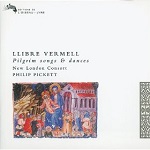

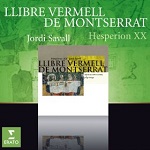 The Llibre Vermell, housed at the Abbey of Montserrat, near Barcelona,
is a collection of devotional songs for pilgrims, assembled in the late
fourteenth century. The texts are in Catalan, Occitan and Latin. No
composer is named for any of the works, but many of the items are very
similar to those contained in an earlier collection compiled by King
Alfonso, known as el Sabio, the Wise.
The Llibre Vermell, housed at the Abbey of Montserrat, near Barcelona,
is a collection of devotional songs for pilgrims, assembled in the late
fourteenth century. The texts are in Catalan, Occitan and Latin. No
composer is named for any of the works, but many of the items are very
similar to those contained in an earlier collection compiled by King
Alfonso, known as el Sabio, the Wise.
There is some overlap between the Paraty and Decca Oiseau-Lyre collections
but choice between the two is not simple. On Paraty we are more aware
of the instrumental accompaniment, which some will find helpful and
others distracting. To put it very crudely, Camerata della Lacrime,
far from living up to their tearful-sounding name, bring out the sheer
vitality of the music, while the New London Consort offer a slightly
more subtle, though by no means po-faced, set of performances. Both
groups perform well but Philip Pickett has the inestimable advantage
of having Catherine Bott as soloist.
The Paraty download comes complete with a booklet of texts and is available
in lossless format, including 24-bit, whereas the best that I can point
you to for the Decca is a 16-bit download and there are no texts. The
Paraty is more forwardly recorded but that’s not to imply that the Decca
sounds backward.
Thanks to the chaotic organisation of my CD collection, I can’t lay
my hands on a third recording – Jordi Savall’s Hespèrion XX selection
of eleven items on Erato (formerly Virgin), but I refreshed my memory
from the invaluable Naxos Music Library. Despite Savall’s reputation
for OTT performances, this is in many ways the most reverential, but
by no means lifeless, account of the music. The CD seems to be deleted
– some postings on the amazon.com site suggest that the version on offer
there is a fake – but sainsburysentertainment.com have it in 320kb/s mp3 for £3.99.
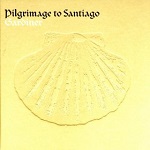
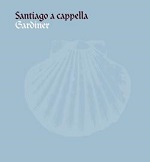
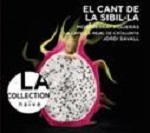 If
you don’t wish to buy any or all of these more complete collections,
the two SDG albums, originally released by DG, combine items from the Llibre Vermell with other music, some of it of a later date,
associated with the pilgrimage to Santiago. These two albums are virtually
self-recommending: John Quinn’s commendation of the second applies equally
to the first.
If
you don’t wish to buy any or all of these more complete collections,
the two SDG albums, originally released by DG, combine items from the Llibre Vermell with other music, some of it of a later date,
associated with the pilgrimage to Santiago. These two albums are virtually
self-recommending: John Quinn’s commendation of the second applies equally
to the first.
The Paraty recording opens with a shortened version of the Catalan Cant
de la Sibil-la, one of the many settings of the Song of the Sibyl emanating from various parts of the Mediterranean. Jordi Savall has
recorded several of these, the most accessible of which, containing
the full Catalan Sibil-la, has recently resurfaced on the mid-price
Naïve LA Collection label: NC40020 – download in mp3 and lossless from eclassical.com (mp3 and lossless, no booklet) or stream from Naxos Music Library.
See DL
Roundup November 2009 for my review of this recording in its Alia
Vox garb.
John DOWLAND (1563-1626) My favourite Dowland
Lady Hunnsdon’s Puffe (P54) [1:24]
The Shoemaker’s Wife. A Toy (P58) [1:07]
La Mia Barbara (P95) [6:01]
Sir John Smith, his Almain (P47) [2:33]
A Fancy (P6) [2:51]
Sir John Langton, his Pavin (P14) [5:58]
The King of Denmark, his Galliard (P40) [2:51]
The Frog Galliard (P23a) [1:59]
Lachrimæ (P15) [5:38]
Galliard to Lachrimæ (P46) [2:32]
Fantasie (P1a) [3:57]
Farewell (P3) [6:17]
Forlorne Hope Fancye (P2) [3:38]
The Right Honourable Robert, Earl of Essex, his Galliard (P42a) [1:45]
A Coye Joye (P80) [0:57]
Mrs Vaux’s Gigge (P57) [1:07]
Mrs Winter’s Jump (P55) [1:29]
The Right Honourable the Lady Clifton’s Spirit (P45) [1:47]
Walsingham (P67) [5:05]
A Fancy (P5) [2:29]
A Pavin (P18) [5:36]
The most sacred Queene Elizabeth, her Galliard (P41) [1:13]
Semper Dowland semper dolens (P9) [7:09]
Paul O’Dette (lute)
Rec. January, 2012, Sauder Hall, Goshen College, Indiana. DDD
pdf booklet included
HARMONIA MUNDI HMU907515 [75:09] – from eclassical.co.uk (mp3, 16- and 24-bit lossless)
Pavans and Fantasies from the Age of Dowland
John DOWLAND Lachrimæ Antiquæ [4:19]
Henry PURCELL (1659-1695) Fantasy upon one note [2:45]
John DOWLAND Lachrimæ Antiquæ Novæ [4:01]
William LAWES (1602-1645) 2 Airs for 4 [3:23]
John DOWLAND Lachrimæ Gementes [3:57]
John JENKINS (1592-1678) Fantasy No. 12 for 2 Trebles and Bass
[3:53]
John DOWLAND Lachrimæ Tristes [5:18]
Thomas MORLEY (1557/8-1602) Lamento for 2 from “Canzonets
for two voyces” [2:34]
John DOWLAND Lachrimæ Coactæ [4:00]
Matthew LOCKE (1621/3-1677) Fantasy for 2 Trebles and Bass from
“The Broken Consort” [4:11]
John DOWLAND Lachrimæ Amantis [4:27]
William LAWES Fantasy in C for 5 [2:25]
John DOWLAND Lachrimæ Veræ [4:10]
John Holloway (violin, viola), Monika Baer (violin, viola), Renate Steinmann
(violin), Susanna Hefti (viola), Martin Zeller (bass violin)
rec. March, 2013, Radio Studio, Zürich. DDD
ECM NEW SERIES 4810430 [49:27] – reviewed as CD, with booklet,
but available for download from emusic.com (mp3, no booklet)

These comments should be read in conjunction with my overview of recordings
of Dowland’s music, old and new, in DL
News 2014/5 – see below for a summary.
Paul O’Dette’s album is not an anthology from his complete recordings
of the works of Dowland – still available separately or as a set, though
for download only – but a new recording made in 2012. I need hardly
add that it shares all the virtues of those earlier recordings and is
likely to tempt you to obtain some of them, in which case you can find
them all at eclassical.com: five volumes on BIS, together with one entitled Seaven Teares, sixteen tracks of some of Dowland’s best-known
music followed by the seven variants known as Lachrimæ (Harmonia
Mundi) and one album of Lute Duets where he is partnered by Jakob Lindberg
(BIS).
 Unlike
that earlier Paul O’Dette recording on Harmonia Mundi, where the ‘seven
tears’ are performed as a continuous group, John Holloway and
his team intersperse Dowland’s best-known work, Lachrimæ, with
other music from a group of composers very loosely described as of his
age. In fact that ‘age’ is loosely interpreted – Dowland was already
long dead when Purcell was born – but the latter continued the then
old-fashioned tradition of writing for the viol consort, so his inclusion
here is justifiable. That brings me to my other reservation – this
is music for a viol consort but it’s played here on modern instruments.
The title page of Dowland’s collection, reproduced in the booklet, does
say ‘for the lute, viols or violons’ and though I prefer the sound of
viols, I can’t complain over-much when the performances themselves are
sympathetic, and the idea of interspersing Lachrimæ with other
music gets round the problem of hearing an uninterrupted series of beautiful
but doleful pieces. Not that the other works are out of character with Lachrimæ – fantasies are not exactly written to be joyful – but
I like the concept.
Unlike
that earlier Paul O’Dette recording on Harmonia Mundi, where the ‘seven
tears’ are performed as a continuous group, John Holloway and
his team intersperse Dowland’s best-known work, Lachrimæ, with
other music from a group of composers very loosely described as of his
age. In fact that ‘age’ is loosely interpreted – Dowland was already
long dead when Purcell was born – but the latter continued the then
old-fashioned tradition of writing for the viol consort, so his inclusion
here is justifiable. That brings me to my other reservation – this
is music for a viol consort but it’s played here on modern instruments.
The title page of Dowland’s collection, reproduced in the booklet, does
say ‘for the lute, viols or violons’ and though I prefer the sound of
viols, I can’t complain over-much when the performances themselves are
sympathetic, and the idea of interspersing Lachrimæ with other
music gets round the problem of hearing an uninterrupted series of beautiful
but doleful pieces. Not that the other works are out of character with Lachrimæ – fantasies are not exactly written to be joyful – but
I like the concept.
Unless you insist on the music being performed by viols, you should
enjoy this album, though I must point out that 49 minutes is very short
measure these days for a full-price CD. Downloading from emusic.com
for £5.46 might help in that respect though I can’t guarantee that the
recording will sound as good – their bit-rates seldom come even close
to the ideal – and there’s no booklet.
For other possibilities regarding Lachrimæ, you’ll find some
suggestions in my review of a recent Fuga Libera recording (FUG718)
in DL
News 2014/5. My benchmark remains the performance headed by Jakob
Lindberg on BIS-CD-315 – see September
2012/1 DL Roundup.
Henry LAWES (1595-1662) Ayres
Have you e’er seen the morning sun? [1:44]
Slide soft you silver floods [3:48]
Bid me but live, and I will live [2:18]
Francis WITHY (c1645-1727) Divisions on a ground [5:31]
Daniel BACHELOR (1572-1619) Prelude [1:50]
Henry LAWES I rise and grieve [6:40]
Or you, or I, nature did wrong [2:09]
Nicholas LANIER (1588-1666) Neither sighs, nor tears, nor mourning
[1:37]
William LAWES (1602-1645) Almain/Corant 1/Corant 2 for two lutes
(transcription for harpsichord and lute) [4:03]
Whither are all her false oaths blown? [3:02]
William LAWES I’m sick of love [3:05]
Nicholas LANIER No more shall meads be deck’d with flowers [5:02]
Daniel NORCOMBE (c.1576-1655) Tregian’s ground [4:49]
Henry LAWES When thou, poor excommunicate [3:11]
Sleep soft, you cold clay cinders [3:39]
Out upon it, I have lov’d [1:20]
Jacques GAULTIER (c.1600-c.1652) Courant [1:30]
Cloches de Mr Gaultier [1:48]
Henry LAWES Sweet stay awhile, why do you rise? [3:16]
O tell me love! O tell me fate! [2:05]
Christopher SIMPSON (1602/1606?-1669) Division on ‘John come
kiss me now’ [2:04]
Henry LAWES Wert thou yet fairer than thou art [2:35]
William LAWES Why so pale and wan, fond lover? [2:08]
Jeffrey Thompson (tenor)
Bertrand Cuiller (harpsichord); Florence Bolton (viols); Benjamin Perrot
(lute, theorbo and baroque guitar)
La Rêveuse/Florence Bolton and Benjamin Perrot
rec. L’église d’Amilly (Loiret), December 2011. DDD
pdf booklet with texts included
MIRARE MIR177 (32774067) [69:00] – from eclassical.com (mp3, 16- and 24-bit lossless)
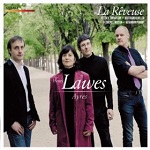
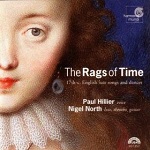 Henry
Lawes was the elder brother of William Lawes, some of whose music is
also contained here, and who died in the English Civil War. Though
the Lawes brothers were royalists, Milton held Henry in genuine esteem
and hailed him in his Sonnet XIII as ‘the Priest of Phœbus Quire’, referring
to the Ayres which form the basis of this album. His music shows
the influence of the Italian stile nuovo and is rather more varied
than that of Dowland and the composers of the earlier period.
Henry
Lawes was the elder brother of William Lawes, some of whose music is
also contained here, and who died in the English Civil War. Though
the Lawes brothers were royalists, Milton held Henry in genuine esteem
and hailed him in his Sonnet XIII as ‘the Priest of Phœbus Quire’, referring
to the Ayres which form the basis of this album. His music shows
the influence of the Italian stile nuovo and is rather more varied
than that of Dowland and the composers of the earlier period.
Jeffrey Thompson sings the music with a pleasant and expressive, often
dramatic, voice; the small instrumental group support him well and provide
interludes between the vocal pieces. The 24-bit recording, in the unusual
24/88.2 format, sounds very well and the booklet is informative.
There’s more music by William and Henry Lawes and some of their contemporaries
in The Rags of Time, Harmonia Mundi HMU907257 on which
Paul Hillier speaks several poems by John Donne and sings, accompanied
by Nigel North (lute). Download from eclassical.com (mp3 and lossless) but with serious black marks, not only for omitting
the booklet but also for failing even to name the poets or composers.
Stream from Naxos Music Library – but no booklet there, either.
Henry PURCELL (1659–1695)
Dido and Æneas, Z636 – Libretto by Nahum Tate (1652–1715)
[56:45]
Pavan in g minor, Z752 [5:08]
Emily Van Evera (soprano) - Dido (or Elissa), Queen of Carthage
Ben Parry (baritone) - Aeneas, a Trojan Prince
Janet Lax (soprano) - Belinda
Hanne Mari Ørbaek (soprano) - Second Woman
Haden Andrews (tenor) - Sorceress
Kate Eckersley (soprano) - Enchantress I
Lucie Skeaping (soprano) - Enchantress II
Sara Stowe (soprano) - Spirit
Douglas Wootton (tenor) - A Sailor
Taverner Choir (Jennie Cassidy, Libby Crabtree, Twig Hall, Rachel Platt,
Christopher Royall, Rodrigo del Pozo, Christopher Hogan, Tom Phillips,
Michael McCarthy, Patrick Ardagh-Walter)
Taverner Players (Andrew Manze, Caroline Balding (violin); Annette Isserlis
(viola); Jennifer Ward Clarke (bass violin); Susanna Pell (bass viol);
David Miller, William Carter (theorbo/guitar); Lucy Carolan, Gary Cooper
(harpsichord)
Pavan (Andrew Manze, Caroline Balding, Richard Gwilt (violin); Mark
Levy (bass viol); Andrew Parrott (organ, direction)
rec. 9–15 September 1994, St Giles Cripplegate, London. DDD
pdf booklet included
AVIE AV2309 [61:53] – from classicsonline.com (mp3) or stream from Naxos Music Library

Oh, good, a new recording, with distinguished participants, of Dido
and Æneas – but it isn’t. For some reason Sony have licensed the
recording, first released in 1999, to Avie. It has always been considered
one of the best recordings; I enjoyed it and its return is welcome,
though it doesn’t quite shake my preference for Sarah Connolly et
al on Chandos CHAN0757: Download of the Month – DL
Roundup February 2009 – or, among older versions, Emma Kirkby, also
with Andrew Parrott, on CHAN0521 or CHAN8036, or another
Emma Kirkby recording, with Christopher Hogwood, reissued on Decca Opera
Company 4783404, two CDs at budget price, with The Indian
Queen. Bargain lovers are well served by the version directed by
William Christie on Erato - £3.49 from 7digital.com,
albeit only at 256kb/s.
André CAMPRA (1660-1744)
Messe de Requiem
Choeur et orchestre de La Chapelle Royale/Philippe Herreweghe
rec. Studio 103 de la Maison de Radio-France, 1987
HARMONIA MUNDI HMG501251 [43:25] – from eclassical.com (mp3 and lossless) or stream from Naxos Music Library. No booklet.
 Simon
Thompson’s only reservation, concerning the short playing time – review – is taken care of by eclassical.com’s per-second pricing policy, which
works out at $7.81. Jake Barlow was also very impressed – review – and it remains only for me to concur with both. I should also remind
readers that the equally fine EBS/John Eliot Gardiner recording remains
available on Erato at about the same lower-mid-price on CD: download
from amazon.co.uk for £3.99 – I can’t vouch for the quality of the Erato
download from Amazon, as I own this in an earlier incarnation on CD.
You can stream both, for comparison, from Naxos Music Library.
Simon
Thompson’s only reservation, concerning the short playing time – review – is taken care of by eclassical.com’s per-second pricing policy, which
works out at $7.81. Jake Barlow was also very impressed – review – and it remains only for me to concur with both. I should also remind
readers that the equally fine EBS/John Eliot Gardiner recording remains
available on Erato at about the same lower-mid-price on CD: download
from amazon.co.uk for £3.99 – I can’t vouch for the quality of the Erato
download from Amazon, as I own this in an earlier incarnation on CD.
You can stream both, for comparison, from Naxos Music Library.
If you are happy with mp3, classicsonline.com is less expensive still for the Herreweghe at £4.99: be careful not
to choose the earlier full-price release, still available from COL.
Neither offers a booklet but the texts of the Requiem Mass are
easy enough to obtain on the web.
Jean-Féry REBEL (1666-1747) Les Élémens, Simphonie
nouvelle (1737/38) [22:47]
Jean-Philippe RAMEAU (1683-1764) Suite from Castor et Pollux (1737) [31:44]
L’Orfeo Barockorchester/Michi Gaigg
(tuning: A’=392Hz)
rec. Kirche der Barmherzigen Brüder, Schärding am Inn, Austria, 21-23
June, 2007 DDD/DSD
Pdf booklet included
CPO 777914-2 [54:32] – from eclassical.com (mp3 and lossless) or stream from Naxos Music Library
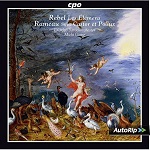 The
opening representation of chaos in Les Élémens must be about
the most discordant music ever composed in the Baroque – much more so
than Haydn’s at the start of Die Schöpfung, especially as performed
here – and must have sounded highly avant-garde at the time.
Not surprisingly, this one work by which Rebel is known appears on 10
recordings at present, four of which appear in diverse formats: the
Akadamie für alte Musik, Berlin on Harmonia Music CD and DVD, with Vivaldi’s Seasons, and the Palladian Ensemble on a single Linn CD (CKD221 – see below) and a 2-CD set. Earlier recordings from Musica Antiqua
Köln/Goebel and the Academy of Ancient Music/Hogwood are available as
downloads only or entrapped in multi-CD boxes.
The
opening representation of chaos in Les Élémens must be about
the most discordant music ever composed in the Baroque – much more so
than Haydn’s at the start of Die Schöpfung, especially as performed
here – and must have sounded highly avant-garde at the time.
Not surprisingly, this one work by which Rebel is known appears on 10
recordings at present, four of which appear in diverse formats: the
Akadamie für alte Musik, Berlin on Harmonia Music CD and DVD, with Vivaldi’s Seasons, and the Palladian Ensemble on a single Linn CD (CKD221 – see below) and a 2-CD set. Earlier recordings from Musica Antiqua
Köln/Goebel and the Academy of Ancient Music/Hogwood are available as
downloads only or entrapped in multi-CD boxes.
The CPO release is a reissue of a recording formerly available on Phoenix
as an SACD – still available as a download in some quarters. In 2009
it was a well-deserving first choice in BBC Radio 3’s Building a
Library. The stylish and vigorous performances are thoroughly enjoyable,
unimpeded – but rather assisted – by historical practice, including
the use of the lower ‘French’ pitch, and that goes for the Rameau, too,
where the competition is a little less intense. The recording sounds
very well in lossless format.
Can it be that someone has taken note of my complaint that downloads
of CPO recordings come without or with only part of their booklet?
On this occasion we have the whole booklet, but minus the rear insert,
so I can tell you when and where the recording was made only by turning
to Naxos Music Library. 10/10 for effort, but only 5/10 for leaving
out that vital information.
If the Suite from Castor et Pollux encourages you to try out
the whole opera, you’ll find my review of the Opus Arte DVD here and William Kreindler’s here.
If music by Marin Marais rather than Rameau appeals as the coupling
for Les élémens, the Palladian Ensemble offer Suites from his Pièces de Violes arranged for small ensemble on LINN CKD221 [69:23] – from linnrecords.com or, slightly less expensively, eclassical.com (both mp3 and 16-bit lossless, with pdf booklet). That recording is
also available on CKD323 – from linnrecords.com,
where the contents of CKD221 are combined with music by Couperin: 2
CDs for the price of one and a half.
Christoph GRAUPNER (1683–1760) Bass Cantatas
Fahre auf in die Höhe, und werffet eure Netze aus (Trinity V,
1746) [18:24]
Suite in B-flat (ca. 1737–46) [20:11]
Jesu edler Hoher priester (Lent V, 1720) [14:23]
Wie wunderbar ist Gottes Güt (Advent III, 1717) [18:51]
Klaus Mertens (bass)
Accademia Daniel/Shalev Ad-el (hsrpsichord and organ)
rec. 23-26 October 2000, Aula der Alten Universität Fulda (Germany).
DDD
pdf booklet with texts and translations included
PAN CLASSICS PC10292 [72:19] – from eclassical.com (mp3 and lossless) or stream from Naxos Music Library
Frohlocke gantzes Rund der Erden, GWV1139/20 (Whit Monday) [13:22]
Ich bin zwar Asch und Koth, GWV1135/13 (Rogation Sunday) [10:34]
Ach Herr mich armen Sünder, GWV1152/46 (Trinity XI) [11:46]
Kommt, last uns mit Jesu gehen, GWV1119/22 (Quinquagesima) [13:34]
Angenehmes Waßer-Bad, GWV1104/11b (Advent IV) [13:56]
Zähle meine Flucht, GWV1154/12b (Trinity XIII) [7:51]
Klaus Mertens (bass-baritone)
Accademia Daniel/ Shalev Ad-El
rec. Trinitätiskirchgemeinde, Chemnitz-Hilbersdorf, Germany, 1-12 November
1-12, 2010
pdf booklet with texts and translations included
CPO 777644–2 [71:23] – from eclassical.com (mp3 and lossless) or stream from Naxos Music Library
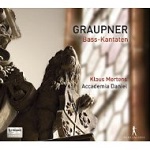
 Christoph
Graupner was the Leipzig Council’s first choice for Kantor of the Thomaskirche
but his employer immediately upped the ante and the council had to choose
a comparative unknown called Johann Sebastian Bach, since when the prolific
and distinguished Graupner has almost completely dropped out of musical
history. Recently, however, he has been receiving more of his due, with
these two recordings of bass-voice cantatas and an equally fine one
of soprano cantatas: Himmlische Stunden, selige Zeiten (Christophorus CHR77381 – DL
News 2014/2).
Christoph
Graupner was the Leipzig Council’s first choice for Kantor of the Thomaskirche
but his employer immediately upped the ante and the council had to choose
a comparative unknown called Johann Sebastian Bach, since when the prolific
and distinguished Graupner has almost completely dropped out of musical
history. Recently, however, he has been receiving more of his due, with
these two recordings of bass-voice cantatas and an equally fine one
of soprano cantatas: Himmlische Stunden, selige Zeiten (Christophorus CHR77381 – DL
News 2014/2).
It doesn’t take much of an eagle eye to spot that both recordings feature
Klaus Mertens as soloist, described on one as bass and on the other
as bass-baritone, and both feature the same instrumentalists and conductor.
These are cantatas for solo voice, but no choir, so much hinges 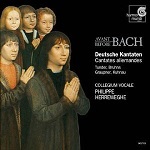 on
the quality of that voice and Mertens’ is both powerful and mellifluous.
With excellent accompaniment and very good recording on both albums,
these works deserve to stand alongside the Telemann Passion Cantatas,
also on CPO, which Mark Sealey welcomed in 2009 – review.
The inclusion of texts and translations with both downloads seals my
approval.
on
the quality of that voice and Mertens’ is both powerful and mellifluous.
With excellent accompaniment and very good recording on both albums,
these works deserve to stand alongside the Telemann Passion Cantatas,
also on CPO, which Mark Sealey welcomed in 2009 – review.
The inclusion of texts and translations with both downloads seals my
approval.
Graupner’s Cantata Herr, die Wasserströme erheben sich, GWV1115/34
(Epiphany IV) [15:48] can be found in a collection entitled Deutsche
Kantaten, with works by Franz Tunder, Johann Kuhnau and Nicolaus
Bruhns on Harmonia Mundi HMA1951703: Collegium Vocale Gent/Philippe
Herreweghe [75:16] – from eclassical.com (mp3 and lossless) or stream from Naxos Music Library (no booklet from
either). Rather cool but enjoyable performances, but the lack of texts
is a problem. The score of the Graupner work can be found at imslp.org,
German text only. The download costs more than the CD when it was available
but it comes at a much more attractive price than the £29.95 being sought
by one seller on Amazon for that CD.
George Frideric HANDEL (1685-1759)
Tamerlano, HWV18, Dramma per musica in 3 acts (1731 version)
Xavier Sabata (counter-tenor) - Tamerlano
Max Emanuel Cencic (counter-tenor) - Andronico
John Mark Ainsley (tenor) - Bajazet
Karina Gauvin (soprano) - Asteria
Ruxandra Donose (contralto) - Irene
Pavel Kudinov (bass) - Leone
Il Pomo d’Oro/Riccardo Minasi
pdf booklet with texts and translations included
Naive V5373 [3CDs: 62:49 + 61:48 + 68:35] – from eclassical.com (mp3 and lossless) or stream from Naxos Music Library
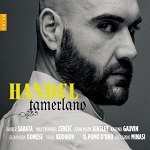 Simon
Thompson has made this his first choice for the work – review – so let me cut to the chase at the outset and agree that this has a
very strong claim to be the prime recommendation. Hitherto that distinction
fell to an MDG recording conducted by George Petrou and on DVD Trevor
Pinnock (ArtHaus Musik), while those in search of a bargain need look
no further than John Eliot Gardiner, whose recording of Tamerlano is available as part of a 6-CD set at budget price (Warner 2564696208,
with L’Allegro and Il Penseroso and ballet music for around
£15).
Simon
Thompson has made this his first choice for the work – review – so let me cut to the chase at the outset and agree that this has a
very strong claim to be the prime recommendation. Hitherto that distinction
fell to an MDG recording conducted by George Petrou and on DVD Trevor
Pinnock (ArtHaus Musik), while those in search of a bargain need look
no further than John Eliot Gardiner, whose recording of Tamerlano is available as part of a 6-CD set at budget price (Warner 2564696208,
with L’Allegro and Il Penseroso and ballet music for around
£15).
With Xavier Sabata as Tamerlano and Max Cencic as Andronico – the latter
building on successes in Faramondo, Farnace, Artaserse and Alessandro – I had the highest expectations of this new recording.
When Cencic comes into his own in the Virgin recording ofFaramondo,
I thought that he outshone even Philippe Jaroussky – review – and his performance here is equally fine. I liked Sabata in Faramondo,
too, though I thought him perhaps a little too overtly dramatic at times.
Since then he has had a very enjoyable CD all too himself, Handel
Bad Guys, again with Il Pomo d’Oro and Riccardo Minassi in support,
on Aparté – review and DL News 2013/10 – there and here he’s even better than in Faramondo.
John Mark Ainsley has some formidable competition from Mark Padmore
in three of his arias (As steals the morn, with English Concert/Andrew
Manze, Harmonia Mundi HMU907422 – download from eclassical.com,
mp3 and lossless) but I’d hate to call the score between the two.
Karin Gauvin, taking on a role sung by Francesca Cuzzoni, is also up
against strong competition – from Lisa Saffer with Philharmonia Baroque
Orchestra/Nicholas McGegan on Arias for Cuzzoni (Harmonian Mundi HMU907036 – from eclassical.com,
mp3 and lossless) and Sandrine Piau on a recently reissued Naïve recital
of Handel Arias (mid-price NC40026,with Les Talens Lyriques and
Christophe Rousset – from eclassical.com,
mp3 and lossless – review).
Those rivals all come on recital albums. Apart from the Petrou, Pinnock and Gardiner CDs/DVDs, there isn’t much competition
for the whole work. No matter: this will do very well indeed. For most
purchasers eclassical.com’s $33.17 (mp3 and lossless) works out less
expensively than classicsonline.com’s £23.97/£26.97 (mp3/lossless).
If mp3 will do, 7digital.com are offering the set for a ridiculous £5.49 – surely a mistake?
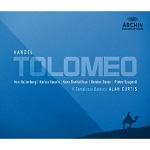 If,
like me, every time you hear the Handel pastiche Silent Worship (‘Did you not hear my lady?’) it becomes an ear-worm for days, you should
enjoy hearing the music in its original context, in the opera Tolomeo,
HWV25 (1728). The English text of the version we normally hear, beautiful
as it is, bears little relation to the original aria, Non lo dirò
col labbro, but then Handel’s libretto bears even less resemblance
to the conflict between Cleopatra and her brother Ptolemy than that
of Giulio Cesare.
If,
like me, every time you hear the Handel pastiche Silent Worship (‘Did you not hear my lady?’) it becomes an ear-worm for days, you should
enjoy hearing the music in its original context, in the opera Tolomeo,
HWV25 (1728). The English text of the version we normally hear, beautiful
as it is, bears little relation to the original aria, Non lo dirò
col labbro, but then Handel’s libretto bears even less resemblance
to the conflict between Cleopatra and her brother Ptolemy than that
of Giulio Cesare.
There’s only one modern recording* and it’s very good, with Alan Curtis
conducting Ann Hallenberg, Karina Gauvin, Anna Bonitatibus, Romina Basso,
Pietro Spagnol and Il Complesso Barocco (DG Archiv 4777106 –
from 7digital.com ). There’s no libretto and you’ll have to re-number the
tracks – I suggest 101-120, 201-216, 301-322 for the three acts respectively
– because of the usual problem of 7digital.com downloading them in the
wrong order, but the bit-rate is better than from Amazon or iTunes.
There’s a synopsis from Wikipedia.
* Naxos Music Library have the Vox first recording, directed by Richard
Auldon Clark. They also have David Hobson singing the aria on ABC 4764018.
Johann Sebastian BACH (1685-1750) Secular Cantatas IV
Cantata No.205: Zerreißet, zersprenget, zertrümmert die Gruft: Der
zufriedengestellte Äolus – Dramma per musica (Æolus pacified: Cantata
for the Birthday of Dr. August Friedrich Müller, 3 August 1725), BWV205
[39:00]
Cantata No.207: Vereinigte Zwietracht der wechselnden Saiten – Dramma
per musica (Cantata for the professorial inauguration of Dr. Gottlieb
Kortte, 11 December 1726?), BWV207 [33:16]
Joanne Lunn (soprano), Robin Blaze (counter-tenor), Wolfram Lattke (tenor),
Roderick Williams (bass)
Bach Collegium Japan/Masaaki Suzuki
rec. July 2013, Shirakawa Hall, Nagoya, Japan. DDD/DSD
pdf booklet with texts and translations included
BIS BIS-SACD-2001 [73:06] – from eclassical.com (mp3, 16- and 24-bit lossless)
Cantata No.201: Der Streit zwischen Phoebus und Pan (The Contest
between Phœbus and Pan), BWV201 [48:55]
Cantata No.205: Zerreißet, zersprenget, zertrümmert die Gruft: Der
zufriedengestellte Äolus – Dramma per musica (Æolus pacified: Cantata
for the Birthday of Dr. August Friedrich Müller, 3 August 1725), BWV205
[38:17]
Cantata No.213: Laßt uns sorgen (Hercules at the Crossroads,
BWV213 [40:17]
Efrat Ben-Nun, Maria Cristina Kiehr, Katharina Kammerloher (soprano),
Andreas Scholl (alto), Christoph Prégardien, James Taylor, Kurt Azesberger
(tenor), Roman Trekel (baritone), Peter Lika, Klaus Häger (bass)
RIAS Kammerchor
Akademie für Alte Musik Berlin/René Jacobs
rec. c.1995 (first released 1996). DDD
No booklet
HARMONIA MUNDI GOLD HMG501544/45 [134:06] – from eclassical.com (mp3 and lossless). Earlier release on HMC901544/45 available for streaming
from Naxos Music Library
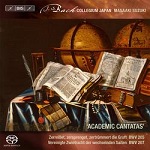
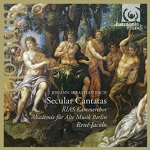 The
latest volume in BIS’s traversal of Bach’s secular cantatas coincides
with the reissue of the 2-CD Harmonia Mundi set. Actually, it’s the
re-reissue of a set once available with a budget HMX catalogue number.
It’s unfortunate that BWV205 is contained on both releases because I
would like to commend both.
The
latest volume in BIS’s traversal of Bach’s secular cantatas coincides
with the reissue of the 2-CD Harmonia Mundi set. Actually, it’s the
re-reissue of a set once available with a budget HMX catalogue number.
It’s unfortunate that BWV205 is contained on both releases because I
would like to commend both.
The virtues of Masaaki Suzuki’s set of the sacred cantatas have been
carried over into the secular cantatas, not least the inclusion of familiar
names among the soloists. Unlike the Harmonia Mundi set, texts and
translations are included, which, together with the fact that the latter
can be found on CD less expensively than as a download, is something
of a deciding factor.
On Harmonia Mundi BWV205 is split across two CDs, a problem obviated
by the download. In addition the download was available in late May
2014, ahead of the release of the CDs in mid-June. On the other hand,
the CDs can be found for around £10 – reduced to £8.75 by one dealer
as I write – which makes the $24.14 for the download rather uncompetitive
in the UK, especially as it comes without booklet. For music as little
known as this, the texts are essential and it’s no excuse that they
can be found online.
John GARTH (1721-1810)
Accompanied keyboard sonatas, Op.2/1-6 [48:32] and Op.4/1-6 [48:50]
Gary Cooper (harpsichord, organ, fortepiano)
The Avison Ensemble (Pavlo Beznosiuk, Caroline Balding (violins), Richard
Tunnicliffe (cello))
rec. St. Martin’s Church, East Woodhay, Hampshire on April 18-21, 2008.
DDD
pdf booklet included
DIVINE ART DDA25115 [2CDs: 48:32 + 48:50] – from classicsonline.com (mp3) or stream from Naxos Music Library
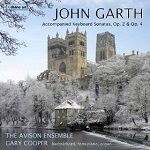 The
only other recording of the music of Durham composer John Garth, comprising
six cello concertos, also comes from Divine Art (DDA25059) and
received a warm welcome from me some time ago. I don’t know why they
delayed the release of this second album – if anything the music is
even more interesting than on its predecessor and the performances are
just as fine as on the earlier set. The mp3 transfer is clear and immediate
and the pdf booklet comes as part of the deal.
The
only other recording of the music of Durham composer John Garth, comprising
six cello concertos, also comes from Divine Art (DDA25059) and
received a warm welcome from me some time ago. I don’t know why they
delayed the release of this second album – if anything the music is
even more interesting than on its predecessor and the performances are
just as fine as on the earlier set. The mp3 transfer is clear and immediate
and the pdf booklet comes as part of the deal.
There’s just one fly in the ointment: Divine Art doubles sell as 2-for-1
and some dealers have this set for a regular price of around £11, currently
reduced to £9.25 by one, so the download price of £15.98 really isn’t
competitive. Theclassicalshop.net have the earlier Divine Art Garth set for £5.00 (mp3) and £9.00 (lossless);
if they release the new album at those prices, that will be the download
to go to. Amazon.co.uk isn’t the place to go – they were asking £14.16
when I checked and their downloads are rarely at better than 256kb/s.
For the moment, then, I recommend listening to the streamed version
from Naxos Music Library or buying the CDs.
Bargain of the Month
Joseph HAYDN (1732-1809)
Symphony No.96 in D (‘Miracle’) [24:54]
Symphony No.94 in G (‘Surprise’) [24:10]
Academy of Ancient Music/Christopher Hogwood
DECCA ROSETTE COLLECTION 4767087 [49:04] – from prestoclassical.co.uk (CD, mp3 and lossless)
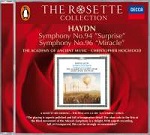 This
is one of a series, never completed, of Haydn Symphonies with names,
whether bestowed by Haydn or others, which the AAM and Christopher Hogwood
made for Decca Oiseau Lyre. Not all Haydn’s best symphonies have nicknames
– there’s even scholarly doubt whether No.96 is the actual symphony
during which the massive chandelier fell but miraculously no-one was
harmed – but it proved a useful peg on which to hang a series of recommendable
recordings, once available on a series of six CD sets.
This
is one of a series, never completed, of Haydn Symphonies with names,
whether bestowed by Haydn or others, which the AAM and Christopher Hogwood
made for Decca Oiseau Lyre. Not all Haydn’s best symphonies have nicknames
– there’s even scholarly doubt whether No.96 is the actual symphony
during which the massive chandelier fell but miraculously no-one was
harmed – but it proved a useful peg on which to hang a series of recommendable
recordings, once available on a series of six CD sets.
Presto have all five volumes – download only – but they also offer two
of the London Symphonies, Nos. 94 and 96, not included in any of the
sets, on CD and as a download. They have recently started to make available
a number of recommendable Universal (Decca and DG) recordings which
have been deleted. The CDs are produced by Presto under licence, rather
in the manner of Hyperion’s Archive Service, and the downloads are available
in mp3 and lossless formats. The present recording was one of the first
batch and it’s on offer at the bargain price of just £3.96 in mp3 and
£4.96 in flac. I’m assured that those prices are correct.
These stylish period-instrument performances offer a very good alternative
to modern-instrument sets of Haydn’s London Symphonies from Colin Davis
(two Decca budget twofers*) and Eugen Jochum (DG Collectors Edition
– download only, also available from prestoclassical.co.uk)
and the lossless download sounds very good. Beecham (EMI/Warner), of
course, is incomparable on two twofers. One small grumble: No.94 follows
much too hard on the heels of No.96.
* I haven’t yet heard the new LSO/Davis recordings of Nos. 92-3 and
97-99, just released on the LSO Live label.
Ludwig van BEETHOVEN (1770-1827)
Violin Concerto in D, Op.61 (Cadenzas by Kreisler) [46:32]
Romance No.1 in G, Op.40 [8:34]
Romance No.2 in F, Op.50 [9:48]
Takako Nishizaki (violin)
Slovak Philharmonic/Kenneth Jean
rec. Reduta Concert Hall, Bratislava, Czech Republic, July 1988. DDD
pdf booklet included
2xHDNA2017 [64:54] – from eclassical.com (mp3, 16- and 24-bit lossless)
 You
won’t find this recording, originally from Naxos and still available
from them, among the list of MusicWeb International recommendations
– here – but it’s certainly not to be consigned to the bin of lost causes,
either. It’s a thoroughly likeable, unexceptionable if also unexceptional,
performance and the recording has come up well in the re-mastered 24-bit
download. As with Kang’s ex-Naxos Sibelius and Elgar concertos and
Nishizaki’s Brahms and Bruch, also reissued by 2xHD and reviewed in
2014/7 and 2014/6 respectively, I enjoyed this recording for the clear-toned
solo and
You
won’t find this recording, originally from Naxos and still available
from them, among the list of MusicWeb International recommendations
– here – but it’s certainly not to be consigned to the bin of lost causes,
either. It’s a thoroughly likeable, unexceptionable if also unexceptional,
performance and the recording has come up well in the re-mastered 24-bit
download. As with Kang’s ex-Naxos Sibelius and Elgar concertos and
Nishizaki’s Brahms and Bruch, also reissued by 2xHD and reviewed in
2014/7 and 2014/6 respectively, I enjoyed this recording for the clear-toned
solo and  very
competent accompaniment without being bowled over by it. With the Naxos
CD still around for around £6, I’m not sure that I’d be prepared to
pay $11.68 for the mp3 or 16-bit and $17.52 is a bit steep for the extra
advantage of 24-bit.
very
competent accompaniment without being bowled over by it. With the Naxos
CD still around for around £6, I’m not sure that I’d be prepared to
pay $11.68 for the mp3 or 16-bit and $17.52 is a bit steep for the extra
advantage of 24-bit.
There’s an element of nostalgia about my own purely personal choice
for a recording of the Beethoven Violin Concerto: Yehudi Menuhin with
the Moscow Philharmonic, conducted by David Oistrakh, coupled with David
and Igor Oistrakh as soloists in Mozart’s Sinfonia Concertante,
K364, on BBC Legends BBCL4019-2, recorded in the Royal Albert
Hall in September 1963. I’m not sure how it came to be made in stereo
at a time when BBC Radio 3 was still broadcast in mono but very decent
stereo it is and the performances are worthy of being dubbed Legends.
Download in mp3 and lossless from eclassical.com for 77 minutes of delight.
Ludwig van BEETHOVEN (1770-1827)
String Quartet in B flat, Op.130 [38:16]
Grosse Fuge, Op.133 [15:34]
Talich Quartet
rec. late 1970s. ADD (formerly released by Calliope)
pdf booklet included
LA DOLCE VOLTA LDV278 [53:50] – from eclassical.com (mp3 and lossless)
String Quartet in B ?at, Op.18/6 [24:08]
String Quartet in f minor, Op.95 [20:01]
String Quartet in F, Op.135 [23:35]
Quartetto di Cremona (Cristiano Gualco, Paolo Andreoli (violins), Simone
Gramaglia (viola), Giovanni Scaglione (cello))
rec. Turin, Banna del Arte, 3-5 September, 2012. DDD.DSD
AUDITE 92.680 [67:52] Hybrid SACD or download from audite.de (mp3, 16- and 24-bit lossless, no booklet) or stream from Naxos Music
Library (with pdf booklet)
String Quartet in e minor, Op.59/2, ‘Razumovsky No.2’ [34:23]
String Quartet in E-?at, Op.127 [35:14]
Quartetto di Cremona (Cristiano Gualco, Paolo Andreoli (violins), Simone
Gramaglia (viola), Giovanni Scaglione (cello))
rec. c.2012. DDD/DSD
No booklet
AUDITE 92.681 [69:42] Hybrid SACD or download from audite.de or download from eclassical.com (mp3 and lossless) or stream from Naxos Music Library.
String Quartet in c minor, Op.18/4 [24:05]
Grosse Fuge in B-flat, Op.133 [15:13]
String Quartet in F, Op.59/1 [39:13]
Quartetto di Cremona (Cristiano Gualco, Paolo Andreoli (violins), Simone
Gramaglia (viola), Giovanni Scaglione (cello))
AUDITE 92.682 [78:31] Hybrid SACD or download from audite.de (mp3, 16- and 24-bit lossless, no booklet)
The Complete String Quartets
String Quartet No.6 in B Flat, Op.18/6 [24:25]
String Quartet No.12 in E Flat, Op.127 [38:32]
String Quartet No.2 in G, Op.18/2 [24:17]
String Quartet No.9 in C, Op.59/3, ‘Razumovsky’ [31:50]
String Quartet No.11 in f minor, Op.95 [20:37]
String Quartet No.14 in c sharp minor, Op.131 [38:07]
String Quartet No.1 in F, Op.18/1 [30:29]
String Quartet No.4 in c minor, Op.18/4 [25:04]
String Quartet No.3 in D, Op.183 [25:09]
String Quartet No.5 in A, Op.18/5 [28:01]
Grosse Fuge for String Quartet in B flat, Op. 133 [15:47]
String Quartet No.7 in F, Op. 59/1, ‘Razumovsky’ [40:56]
String Quartet No.8 in e minor, Op. 59/2, ‘Razumovsky’ [35:36]
String Quartet No.10 in E flat Op.74, ‘Harp’ [21:36]
String Quartet No.13 in B flat, Op.130 [39:43]
String Quartet No.15 in a minor, Op.132 [46:25]
String Quartet No.16 in F, Op.135 [24:39]
Belcea Quartet (Corina Belcea, Axel Schacher (violin); Krzysztof Chorzelski
(viola); Antoine Lederlin (cello)
rec. live, The Britten Studio, Snape (Aldeburgh Music), 3/4 December
2011, 23/25 March, 18/19 May, 13 October and 1/2 December 2012. DDD
ZIG-ZAG TERRITOIRES ZZT344 [8-CD equivalent: 8:41:07] – download
from 7digital.com (mp3) or purchase CDs from outhere.com or amazon.co.uk or amazon.com or arkivmusic.com.
No booklet with download but pdf version available from outhere.com
In gathering together some recent releases and reissues of some or all
of the Beethoven Quartets for comparison, I’m concentrating on the most
difficult to bring off, the late quartets, and Op.130 in particular.
 The
oldest of these is from the Talich Quartet, whose recordings
of the complete quartets are also available on LDV121.7, 7 CDs
for around £32. Mark Sealey’s view was ‘This is unlikely to be your
reference cycle; or your first choice. The insight offered by the Talich
Quartet into what Beethoven ‘meant’ by his chamber music is adequate
though not definitive. The beauty of their playing, though, is undeniable,
easy to listen to and appealing. That said, other cycles are undoubtedly
more revealing, more striking and more satisfying overall.’ He thought
their performance of Op.130 steady and level-headed. Others have been
more impressed, using epithets and phrases such as profound, intimate
and closer than most to the heart of the music and I lean more to the
latter viewpoint.
The
oldest of these is from the Talich Quartet, whose recordings
of the complete quartets are also available on LDV121.7, 7 CDs
for around £32. Mark Sealey’s view was ‘This is unlikely to be your
reference cycle; or your first choice. The insight offered by the Talich
Quartet into what Beethoven ‘meant’ by his chamber music is adequate
though not definitive. The beauty of their playing, though, is undeniable,
easy to listen to and appealing. That said, other cycles are undoubtedly
more revealing, more striking and more satisfying overall.’ He thought
their performance of Op.130 steady and level-headed. Others have been
more impressed, using epithets and phrases such as profound, intimate
and closer than most to the heart of the music and I lean more to the
latter viewpoint.
Op.130 and its original finale, the Grosse Fuge, are separated
on the complete set but united on this single-CD release, so you can
choose whether to play the original Fuge or the conventional
finale – you aren’t likely to want both in succession. Given that no-one
has ever quite matched the intensity of Klemperer’s recording of the
orchestrated version of this work, anyone in search of a single recording
as an introduction to the later quartets could do much worse than start
here.
Confusingly, eclassical.com also have the Talich Quartet’s performances
differently coupled: Op.18/1-3 on LDV271,
Op.18/4-6 on LDV272,
Opp. 95, 127 and 133 on LDV273, Op.59/1 and Op.74 on LDV274,
Op.130 and Op.59/2 on LDV275,
Op.131 and Op.59/3 on LDV276 and Op.132 and 135 on LDV277.
All in mp3 and lossless, with pdf booklet.
The Belcea Quartet and Quartetto di Cremona are both comparatively
youthful ensembles who have made fine reputations in a short time.
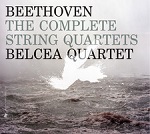
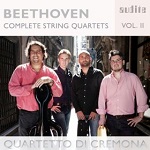
Let me get one complaint out of the way first: unlike the eclassical.com
La Dolce Volta album, neither of the downloads of the Cremona Quartet
from audite.de nor the one from eclassical.com comes with a booklet;
only for Volume 1 of this series can a booklet be obtained from Naxos
Music Library. The same holds true for the Zig-Zag download from 7digital.com
– and, indeed, all downloads from this source. Download purchasers
deserve to have all the apparatus that comes with the CD or SACD. Having
said that, however, I must point out that the multi-lingual booklet
which came with my press download of the Belcea Quartet is not very
informative, with more photos of the quartet than analysis of the music.
The Quartetto di Cremona, formed in 2000, plunged in at the deep
end in 2013 with quartets from Beethoven’s early, middle and late periods.
So far they have recorded the three volumes listed above.
The Belcea Quartet have won awards in several quarters for their
Beethoven and Stephen Greenbank thought this cycle an impressive achievement
to which he planned to return often – review.
Their recordings are also available on two 4-CD sets but the 8-CD set
represents a considerable saving, unless you download from classicsonline.com,
who haven’t realised that this is a bargain set and are asking £63.92
(mp3) or £71.92 (flac) for a set which you should be able to find on
CD for about a third of that price – at least COL throw in the booklet.
Comparisons may be odious – or odorous as Dogberry would have it in Much Ado about Nothing – but I’m going to compare the two groups
in one each of the early, middle and late quartets and both with Op.130
and Op.133 from the Talich Quartet.
Aline Nasif thought that the Belcea Quartet, live at the Wigmore Hall
in 2004, gave a very fine performance of Op.18/3, though he wondered
if they put quite enough feeling into the slow movement – review.
That might have been a good place for a comparison, but the Audite series
has not yet included Quarettto di Cremona in that work for comparison,
so I’ve chosen Op.18/6 instead. Both ensembles choose tempi in all
four movements very similar to each other and to those on my benchmark
Takács Quartet recording (Decca). Both do all they can to stress the
maturity of this early work and if the Belcea Quartet slightly lack
the vigour of the Quartetto di Cremona in the opening work, that may
be due to the lower quality of the outhere.com press download – concerning
which, see below.
So far Audite have recorded two of the middle-period Razumovsky Quartets.
Stephen Greenbank praised the Belcea recording of Op.59/1, so that’s
the one that I shall compare. Here again tempi are very similar, with
the Belcea very slightly slower overall, especially in the second movement,
where their time of 9:13 compares with the Cremona players’ 8:45 and
the Takács’ 8:18. As so often, timings can be deceptive: heard on its
own terms, the Belcea performance is light and airy and it’s only by
comparison that the Cremona performance seems to have greater energy,
an impression again, perhaps, strengthened by the higher quality transfer.
I liked both in their different ways but I suppose that the Belceas
come closer to the allegretto vivace e sempre scherzando marking
by a small margin.
The late quartets, usually defined as from Op.127 onwards, are among
the most challenging chamber works for any group to perform. I first
got to know most of them from the Budapest Quartet’s powerful stereo
versions for CBS but the general consensus has been in favour of the
Quartetto Italiano (Decca, two 2-for-1 sets, 4547112 and 4547122)
and the Takács Quartet (Decca 4708492, 3 CDs). The latter remains
my benchmark, as it was when I listened to the BIS recording of orchestral
versions of the late quartets for DL News 2014/1.
The Talich Quartet’s recording has come up fresh-sounding in this transfer
and their performances of Op.130 and Op.133 come very close to rivalling
my Takács Quartet benchmark in conveying the beauty and power which
are combined in these works in such a wayward manner as to puzzle their
original hearers and most who have come freshly to them since.
The Belcea Quartet give the Andante and Cavatina movements
of Op.130 a little more time to breathe and make them sound more heartfelt
than the Talich or Takács players. Which approach you prefer will depend
on personal taste. Their account of the Grosse Fuge comes a
little incongruously after two of the early Op.18 quartets but otherwise
there’s little to choose between their version and that of the Talich
Quartet. Had I heard their performance of Op.130 and Op.133 live, I’m
sure that I would have been as impressed as Peter Grahame Woolf was,
hearing them live early in their performing career, in 2000 – review.
The press download of the Belcea Quartet to which I listened was at
a barely adequate 192 kb/s – if Outhere really want reviewers to hear
their recordings at their best, they should up their game to the full
320 kb/s or even to lossless quality – but it sounded good enough for
me to think that the 320 kb/s version from 7digital.com should be fine
and the lossless from classicsonline.com even better if they can get
their pricing sorted out.
I listened to the Cremona Quartet’s Grosse Fuge in Audite’s 24/44.1
download – their set hasn’t yet reached Op.130. Of the versions under
consideration it and the Dolce Volta Talich album are the only ones
available as lossless downloads apart from the unreasonably-priced COL
version of the Belcea set. With a more recent, digital, recording and
the availability of 24-bit sound it has an audible advantage over the
Dolce Volta, as good as that is. Though I’ve said that the late quartets
are hard to bring off – and the Grosse Fuge perhaps the hardest
of all; it’s a crazy, almost demented, fugue such as Bach could never
have written or, probably, wanted to – there’s remarkable similarity
of approach and tempo from all three quartets under consideration in
this work.
I’ve already said that Talich would make a good introduction to late
Beethoven, but if I were forced to make a Desert Island choice, the
greater immediacy of the Audite recording would just win the day. Overall
I could live happily with both the Cremona and Belcea quartets in Beethoven,
especially given a better-quality transfer of the latter. If you would
like to make your own comparison on a more level playing field and have
access to Naxos Music Library, you can stream Volume 1 of the Zig-Zag
set and all three of the volumes of the Audite to date there.
Franz Peter SCHUBERT (1797-1828) Late Piano Sonatas
Piano Sonata in a minor, D784, Op.posth.143 [22:41]
Piano sonata in c minor, D958 [31:35]
Piano sonata in A, D959 [38:17]
Piano Sonata in B flat, D960 [36:29]
Paul Lewis (piano)
rec. September 2002 (D959 and 960), March-April 2013 (D784 and 958),
Teldex Studio, Berlin.
HARMONIA MUNDI HMC902165.66 [129:02] – from eclassical.com (mp3, 16- and 24-bit lossless)
(see also reviews by Kirk McElhearn and Brian Wilson in DL
News 2014/7)
 The
Sonata in a minor, D784, is a work of great drama, and at the outset
Paul Lewis plays the ominous-sounding opening octaves with great conviction.
He gives a fine and musical account, full of meaning and understanding
of the style. But why does he pedal through the quaver rest in the first
phrase? I remember as a student the fuss my professors at the Guildhall
School of Music made about the importance of rests in Schubert. Not
only here, but elsewhere in the sonatas recorded here, Lewis sometimes
pedals through the rests. Maybe I am too much of a fusspot but I do
prefer musicians to be accurate with the text, even if they are great
players! But no niggles with the remaining two movements and these are
finely played. This sonata, composed in 1823, gives us many hints as
to what is to come in the three, late and great sonatas that follow
in this double album set.
The
Sonata in a minor, D784, is a work of great drama, and at the outset
Paul Lewis plays the ominous-sounding opening octaves with great conviction.
He gives a fine and musical account, full of meaning and understanding
of the style. But why does he pedal through the quaver rest in the first
phrase? I remember as a student the fuss my professors at the Guildhall
School of Music made about the importance of rests in Schubert. Not
only here, but elsewhere in the sonatas recorded here, Lewis sometimes
pedals through the rests. Maybe I am too much of a fusspot but I do
prefer musicians to be accurate with the text, even if they are great
players! But no niggles with the remaining two movements and these are
finely played. This sonata, composed in 1823, gives us many hints as
to what is to come in the three, late and great sonatas that follow
in this double album set.
The next Sonata is in c minor, D958, another work imbued with sadness
and longing. Lewis is well up of the drama of the opening movement and
the middle section of the ensuing Adagio. He plays the Adagio’s
first theme in elegiac fashion and coaxes a lovely tone from his piano.
Schubert’s two final sonatas make up the second disc, but these recordings
are older, dating from 2003. D959 in A begins strongly with affirmative
chords, but with maybe a little too much rubato for the first
phrase. Lewis moves on with powerful cascades of sound and I like his
retreat into the lyrical second subject. He captures the moods admirably,
moving easily from sad and melancholy to powerful and dramatic. A very
effective and beautifully crafted performance. The Andantino which follows is serene and elegiac. Lewis demonstrates a subtle control
of dynamics; for example he doesn’t begin too softly, and this allows
for a very telling pianissimo further on. Following a very exciting
middle section where Lewis’ virtuosity comes to the fore, he makes a
beautiful return to the now varied first theme. The Scherzo begins
delicately enough and is very characterful with dazzling flourishes
of fast notes. But sometimes I find his rubato a bit strange
and idiosyncratic. I always feel that the fourth movement is rather
overlong and so it is essential that the pianist adopts just the right
tempo. Lewis does so. In fact he plays this movement beautifully, but
also with plenty of drama where needed. I felt that this was a really
convincing interpretation, holding our attention to the end.
As Brian Wilson points out, the real test of a Schubert player comes
with the late and great final Sonata, D960. So I looked at this performance
in a bit more detail and made some comparisons. There are many fine
qualities in Lewis’s performance. The chords at the start are rich and
nicely balanced without bringing out the top notes of the chords excessively.
I particularly like his wide variety of telling articulation and the
subtlety of his pedalling in this first movement, but in spite of so
many good points I find Lewis’ tempo increases, often at crescendos
and where the music becomes more complex, unsettling. This is a shame
because everything else about the performance and recording is so good,
and these tempo changes seem unnecessary and unconvincing to me. Also
he omits the exposition repeat, which I believe it is important to retain.
Murray Perahia on Sony Classical is more convincing in all these respects
but I marginally prefer Lewis’ sound quality.
However, no one I have heard matches Alfred Brendel on Philips*, especially
for warmth and colour in the chordal passages and the melodic line.
His rubato seems perfectly judged to me, but, like Lewis, he
does omit the exposition repeat.
Lewis’ second movement Andante sostenuto begins a tad too loudly
for a pianissimo and the crescendi are a bit boomy and
sudden compared with Brendel for example, who is in elegiac mood here
and he produces a more beautiful tone. But there are some convincing
and subtle moments in Lewis’ performance. Lars Vogt on Cavi plays this
movement very slowly indeed and rather too heavily for my liking.
The third movement, Scherzo goes like the wind. Lewis plays with
great delicacy, as requested by the composer, but Lars Vogt gives more
clarity of the parts between the hands, but again, it is bit on the
slow side. Once again Brendel is unsurpassed with his wide variety of
touch and articulation, imbued with a gentle wit here and there. Lewis
give an attractive performance of the final movement. He achieves some
lovely sounds, colourful articulation and drama where required. Fabulous
though Brendel’s performance is, I prefer the fractionally faster tempo
adopted by Lewis. Real virtuosity is displayed and Lewis’ final Presto is sure to bring the house down in this, one of Schubert’s greatest
works.
Paul Lewis is one of today’s finest pianists but unfortunately for him,
there are so many great recordings of these late sonatas around that
comparisons are inevitable. So on the whole, these are fine and refreshing
accounts, but the tempo fluctuations somehow distort the structure in
some movements. Don’t throw away your Brendel and Curzon!
Geoffrey Molyneux
* I forgot to mention my own high regard for Brendel in this sonata.
The ADD version which I have owned and enjoyed for a long time (Philips 4206442,
with the Wanderer Fantasia) is available only as a download –
from prestoclassical.co.uk (mp3 or lossless). (BW)
Franz Peter SCHUBERT (1797-1828)
Der Strom, D565 [1:40]
Auf der Donau, D553 [3:20]
Lied eines Schiffers an die Dioskuren, D360 [3:03]
Nachtstück, D672 [5:28]
Viola, D786 [13:30]
Abendstern, D806 [2:17]
Gondelfahrer, D808 [1:58]
Auflösung, D807 [3:10]
Widerschein, D949 [3:45]
Alinde, D904 [3:52]
Rastlose Liebe, D138 [1:16]
Geheimes, D719 [1:53]
Versunken, D715 [2:06]
Der Winterabend, D938 [7:20]
Die Sterne, D939 [3:16]
Strophe aus ‘Die Götter Griechenlands’, D677 [5:16]
An den Mond, D259 [3:29]
Spoken introduction: An den Mond, D296 [00:16 + 6:20]
Ian Bostridge (tenor); Julius Drake (piano)
rec. September 2013, Wigmore Hall, London
pdf booklet included.
WIGMORE HALL LIVE WHLIVE0067 [73:15] – from classicsonline.com (mp3) or stream from Naxos Music Library
 I
was listening lately to Ian Bostridge’s wonderful recording of Die
schöne Müllerin, which was part of Hyperion Records’ Schubert edition,
recorded back in 1996. (CDJ33025)
I’ve always found Bostridge to be one of my favourite tenors singing
Schubert’s lieder, and I marvelled at his interpretation of the song
cycle, recorded when he was in his early thirties, but only a few years
after he had begun his singing career. Now approaching fifty, it’s fair
to say that the promise of those early days has been fulfilled. He remains
one of the finest singers of lieder, though his repertoire extends far
beyond that type of music to include a great deal of Britten, some Bach,
and music by other composers in between.
I
was listening lately to Ian Bostridge’s wonderful recording of Die
schöne Müllerin, which was part of Hyperion Records’ Schubert edition,
recorded back in 1996. (CDJ33025)
I’ve always found Bostridge to be one of my favourite tenors singing
Schubert’s lieder, and I marvelled at his interpretation of the song
cycle, recorded when he was in his early thirties, but only a few years
after he had begun his singing career. Now approaching fifty, it’s fair
to say that the promise of those early days has been fulfilled. He remains
one of the finest singers of lieder, though his repertoire extends far
beyond that type of music to include a great deal of Britten, some Bach,
and music by other composers in between.
He has recorded a number of discs of Schubert, but this one is a live
recording, from a recital at Wigmore Hall in September 2013, with pianist
Julius Drake, his long-time accompanist. Performing a selection of songs
covering most of Schubert’s life, Bostridge created here a fine recital
showing the full range of Schubert’s song-writing. From the joyous Alinde (D904), late in the composer’s life, to the early An den Mond (two settings), he also sings the long Viola (D 786), the “long
flower poem that ponders the corruption of innocence and the blighting
of health.” At over thirteen minutes, this is one of Schubert’s longest
songs, and Bostridge tells its story beautifully. As he ages, Bostridge
becomes a master of this form, and his confidence and excellent technique
come across here very well.
This is a recording of one of four recitals Bostridge gave at Wigmore
Hall, and one can only hope that the others will be issued on disc.
The intimate sound is excellent, with a good balance between the singer
and piano.
Kirk McElhearn
Recording of the Month
 Robert
SCHUMANN (1810-1856) Heine Songs, Romances and Ballads
Robert
SCHUMANN (1810-1856) Heine Songs, Romances and Ballads
Tragödie, Op.6/3 (1841 or earlier) [3:40]
Die beiden Grenadiere, Op.49/1 (1840) [3:54]
Abends am Strand, Op.45/3 (ca 1840) [3:25]
Die feindlichen Brüder, Op.49/2 (1840) [2:27]
Der arme Peter, Op.53/3 (1840) [5:00]
Belsatzar, Op. 57 (1840) [4:56]
From Myrthen, Op.25 (1840)
Die Lotosblume, Op.25/7 [1:52]
Was will die einsame Träne? Op.25/21 [2:06]
Du bist wie eine Blume, Op. 25/24 [1:57]
Songs originally conceived for Dichterliebe
Lehn’ deine Wang’ an meine Wang’, Op.142/2 (1840) [0:46]
Es leuchtet meine Liebe, Op.127/3 (1840) [1:52]
Dein Angesicht so lieb und schön, Op.127/2 (1840) [2:20]
Mein Wagen rollet Langsam, Op.142/4 (1840) [3:20]
Dichterliebe, Op.48 (1840) [31:47]
Gerald Finley (baritone)
Julius Drake (piano)
rec. October 2007, All Saints’ Church, East Finchley, London. DDD.
pdf booklet with German texts and English translations included
HYPERION CDA67676 [70:09] – from hyperion-records.co.uk (mp3 and lossless)
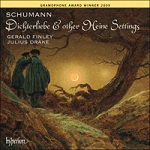 Benchmark: DG 4744662 (2 CDs, budget price) Dietrich Fischer-Dieskau/Christoph
Eschenbach (rec. 1979, with Liederkreis, Op.24 and Op.39 and
other Lieder, some items with Jörg Demus, piano). Also available in
6-CD set 4777957.
Benchmark: DG 4744662 (2 CDs, budget price) Dietrich Fischer-Dieskau/Christoph
Eschenbach (rec. 1979, with Liederkreis, Op.24 and Op.39 and
other Lieder, some items with Jörg Demus, piano). Also available in
6-CD set 4777957.
All through the month of May the first song from Dichterliebe, Im wunderschönen Monat Mai has kept popping unbidden into my
head. It will be July by the time that you read this, but that’s no
reason not to endorse John Quinn’s praise of Gerald Finley’s recording –
review – and to give it my Recording of the Month award. Among other virtues it reminds me that Schubert and Wolf were
not the only great Lieder composers.
Finley does the impossible and trumps Dietrich Fischer-Dieskau, whose
1979 recording with Christoph Eschenbach I had thought unassailable:
he actually makes Dieskau sound slightly under-characterised in some
of the songs by comparison. I shall not be getting rid of my DG CD
– an earlier release on 4394172, with many of the same Lieder
which are included on the Hyperion recording. That older release is
well worth looking out for because it coupled a 1985 performance by
Brigitte Fassbaender and Irwin Gage of Frauenliebe und –leben,
which seems to be no longer available, at least on a single album.
A hopeful seller is asking £101.75 on Amazon for the deleted Australian
Eloquence reissue as I write.
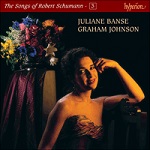
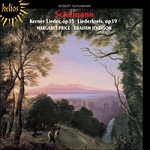
That Eloquence reissue restored the original coupling of Frauenliebe with Liederkreis, Op.24, but Hyperion can offer consolation prizes
for its loss with a recording of the former by Juliane Banse and Graham
Johnson (CDJ33103 – from hyperion-records.co.uk,
mp3 and lossless, with pdf 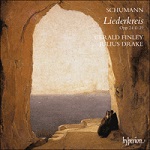 booklet).
They also have Margaret Price and Graham Johnson in the other Liederkreis,
Op.39, recorded in 1991, on the budget Helios label (CDH55011 with Kerner Lieder, Op.35 – from hyperion-records.co.uk,
mp3 and lossless, with pdf booklet). David Wright was far from alone
in his praise of Banse and Johnson as CD of the decade – review – while the Helios reissue was deservedly chosen and praised as one
of the first batch of releases on that label in 1999.
booklet).
They also have Margaret Price and Graham Johnson in the other Liederkreis,
Op.39, recorded in 1991, on the budget Helios label (CDH55011 with Kerner Lieder, Op.35 – from hyperion-records.co.uk,
mp3 and lossless, with pdf booklet). David Wright was far from alone
in his praise of Banse and Johnson as CD of the decade – review – while the Helios reissue was deservedly chosen and praised as one
of the first batch of releases on that label in 1999.
If you are looking for a male-voice recording of the two Liederkreis,
Op.24 and Op.39, Hyperion ride to the rescue yet again with another
Gerald Finley/Julius Drake offering on CDA67944 (with Sechs
Gedichte, Op.36, with pdf booklet – from hyperion-records.co.uk,
mp3, 16- and 24-bit lossless), a fine recording, justly praised by John
Quinn – review – and, slightly less confidently, by Simon Thompson – review.
Antonín DVOŘÁK (1841-1904)
Piano Trio No.3 in f minor, Op.65, B130 [41:20]
Piano Trio No.4 in e minor ‘Dumky’, Op.90, B166 [31:43]
The Tempest Trio (Ilya Kaler (violin), Amit Peled (cello), Alon Goldstein
(piano)
rec. Spencerville Seventh-day Adventist Church, Silver Spring, Maryland,
USA, 26-29 May, 2013. DDD
pdf booklet included
NAXOS 8.573279 [73:02] – from eclassical.com or classicsonline.com (both mp3 or lossless) or stream from Naxos Music Library
Comparative recordings:
• Hyperion CDA66895 : Florestan Trio – from hyperion-records.co.uk (mp3 and lossless)
• Supraphon SU3872-2 : Smetana Trio – from emusic.com (mp3)
Nos.1-4:
• Champs Hill Records CHRCD034: Gould Piano Trio – from classicsonline.com (mp3) or stream from Naxos Music Library – review Nos.1-4:
• Chandos CHAN241-24: Borodin Trio – from theclassicalshop.net (mp3
and lossless) or stream from Naxos Music Library. See DL
Roundup July 2012/2 for the four recordings above.
No.3:
• BIS-SACD-2059: Sitkovetsky Trio (+ SMETANA Piano
Trio in g, Op.15; SUK Elegie) – from eclassical.com (mp3, 16- and 24-bit lossless) or stream from Naxos Music Library

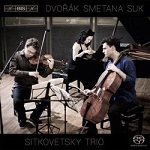 The
new Naxos recording, billed as Volume 1, enters some hotly contested
territory. In July 2012/2 I weighed up the merits of several very fine
versions of all the trios or Nos. 3 and 4 and came to the conclusion
that my Desert Island version would have to be the Florestan Trio on
Hyperion, though I also liked the idiomatic performances from the Smetana
Trio. How well does the newcomer, with something of a price advantage
on CD, though the difference is less as a download, compare and where
does the recent BIS recording of No.3, with Smetana and Suk, come into
the reckoning?
The
new Naxos recording, billed as Volume 1, enters some hotly contested
territory. In July 2012/2 I weighed up the merits of several very fine
versions of all the trios or Nos. 3 and 4 and came to the conclusion
that my Desert Island version would have to be the Florestan Trio on
Hyperion, though I also liked the idiomatic performances from the Smetana
Trio. How well does the newcomer, with something of a price advantage
on CD, though the difference is less as a download, compare and where
does the recent BIS recording of No.3, with Smetana and Suk, come into
the reckoning?
If you want all four trios the Champs Hill set is very good value –
you should be able to find the CDs for around £11, which is less than
you are likely to have to pay for the download – as also is the Chandos,
a 2-for-1 offer both on CD and as a download, but I’d still go for the
Florestan Trio on Hyperion – Nos.1 and 2 are on CDA67572, with
Suk’s Elegy. If it’s just the two best-known trios, the new
Naxos should do very well – vigorous and idiomatic performances, well
recorded, especially in the lossless eclassical.com download – and if
you already have a version of the Dumky Trio, but not No.3, the
BIS recording brings a good performance, coupled with equally competitive
accounts of the Smetana and Suk.
As so often, I’m left summing up that you pay your money and take your
pick of couplings. The BIS and Naxos are the only ones available as
24-bit downloads and even though it comes at a premium over the mp3
and 16-bit, at $17.55 the BIS in that format is still competitive with
the price of most CDs. The Naxos costs $19.72 in 24-bit format and
even in 16-bit it’s $13.15 when classicsonline.com have it for £4.99 (mp3) or £5.99 (lossless), albeit that the lossless
comes inconveniently as one long file. Only you can decide if it’s
essential to have the 24-bit or, like me, you find COL’s long undivided
files most inconvenient and are prepared to pay more even than for the
CD.
Gabriel FAURÉ (1845-1924)
Masques et Bergamasques Suite, Op.112 [13:40]
Fantaisie, Op.79 (arr. Y. Talmi for flute and orchestra) [5:27]
Pelleas et Mélisande Suite, Op.80 [18:16]
Berceuse, Op.16 [4:13]
Elégie, Op. 24 (version for cello and orchestra) [6:57]
Dolly Suite, Op. 56 (arr. H. Rabaud) [16:18 ]
Pavane, Op.50 (version for choir and orchestra) [5:28]
Seattle Symphony and Chorale/Ludovic Morlot
rec. Benaroya Hall, Seattle, WA, October 2011, February, May and November
2012, February and May 2013. DDD
pdf booklet included
SEATTLE SYMPHONY MEDIA SSM1004 [70:19] – from eclassical.com (mp3 and lossless)

 Comparative
version: Masques et Bergamasques, Pavane, Fantaisie, Elégie, Dolly Suite: CHAN9416 – BBC Philharmonic/Yan
Pascal Tortelier – rec. May 1995 (with Ballade and Pénélope Prelude) – from theclassicalshop.net (mp3 and lossless, with pdf booklet) [71:11]
Comparative
version: Masques et Bergamasques, Pavane, Fantaisie, Elégie, Dolly Suite: CHAN9416 – BBC Philharmonic/Yan
Pascal Tortelier – rec. May 1995 (with Ballade and Pénélope Prelude) – from theclassicalshop.net (mp3 and lossless, with pdf booklet) [71:11]
The best-known work on these two recordings, Pavane, is typical
of Fauré’s music – mostly gentle and undemanding but not by any means
insignificant. The Chandos recording has stood the test of time well
and makes a worthy benchmark but the new rival from Seattle presents
such strong competition that choice of coupling could safely be your
guide. All in all, I prefer the inclusion of Ballade on the Chandos
album, with Kathryn Stott’s fine contribution in that work and Yan Pascal
Tortelier’s slightly slower tempi work well for me. On the other hand,
the choral version of Pavane on the Seattle recording might clinch
it for you.
Both sound well; neither is available in 24-bit, though the Chandos
was recorded in 24/96 format.
The Spirit of England
Edward ELGAR (1857-1934) The Spirit of England, cantata
for soprano, tenor, chorus and orchestra with organ, Op.80 (1916-17)
[27:17]
Frederick Septimus KELLY (1881-1916) Elegy for Strings ‘In Memoriam
Rupert Brooke’, tone poem for harp and strings (1915) [8:16]
Ivor GURNEY (1890-1937) War Elegy (1920) [11:06]
Charles Hubert Hastings PARRY (1848-1918) The Chivalry of
the Sea, naval ode for five part chorus and orchestra (1916) [13:59]
Lilian ELKINGTON (1901-69) Out of the Mist, tone poem
(1921) [7:50]
Susan Gritton (soprano), Andrew Kennedy (tenor)
Ian Farrington (organ)
BBC Symphony Orchestra and Chorus/David Lloyd-Jones
rec. 25–27 February 2006, The Colosseum, Town Hall, Watford. DDD
DUTTON EPOCH CDLX7172 [69:00] – from amazon.co.uk (mp3, no booklet)
‘This disc of Great War inspired scores makes a worthy addition to the
catalogue and contains some superb music.’ See review by Michael Cookson.
 With
WWI-themed programmes on TV and in history magazines, you are unlikely
to have missed the fact that we shall soon be celebrating the centenary
of the outbreak of hostilities, so now seems a good time to remind you
of this superb recording of music inspired by what Wilfred Owen called
the pity of war. If you missed out on the CD, the download from Amazon
can be yours for just £5.99. The bit-rate hovers around 230kb/s – why
is it that Amazon never quite match their declared 256kb/s, itself short
of the ideal? – but the sound is more than adequate. More seriously,
you miss the booklet of notes, though Michael Cookson’s review will
help in that respect. The txt of The Spirit of England is available here.
With
WWI-themed programmes on TV and in history magazines, you are unlikely
to have missed the fact that we shall soon be celebrating the centenary
of the outbreak of hostilities, so now seems a good time to remind you
of this superb recording of music inspired by what Wilfred Owen called
the pity of war. If you missed out on the CD, the download from Amazon
can be yours for just £5.99. The bit-rate hovers around 230kb/s – why
is it that Amazon never quite match their declared 256kb/s, itself short
of the ideal? – but the sound is more than adequate. More seriously,
you miss the booklet of notes, though Michael Cookson’s review will
help in that respect. The txt of The Spirit of England is available here.
Even if you have another recording of Elgar’s The Spirit of England,
and that is receiving its first recording in the two-voice version,
the Dutton album is well worth having for the other items, most of them
receiving their first – and only, to date – recordings. The alternative
version is available inexpensively on Chandos Collect CHAN6574 (with Coronation Ode – August
2012/1 DL Roundup) and in a 30-CD EMI box ( 5036032).
For another Dutton recording of music inspired by war, there’s Ronald
Corp’s And all the Trumpets sounded on CDLX7280, coupled
with Michael Hurd’s The Shepherd’s Calendar – review and DL
Roundup July 2012/1. Belated apologies for calling him Reginald
Corp in that Roundup.
Claude DEBUSSY (1862-1918)
La Mer [25:00]
Cello Sonata in d minor [10:50]
Chicago Symphony Orchestra/Fritz Reiner
Paul Tortelier (cello); Ernest Lush (piano)
PAST CLASSICS [35:50] – from emusic.com (mp3)

With Fritz Reiner’s La Mer now encased in one of those huge boxes
which sadly enshrine so many great recordings these days – in this case
a 60-CD RCA set – this transfer of La Mer is worth £0.42 of anyone’s
money. It comes in reasonably decent stereo, if a little harsh at climaxes:
HDTT or Beulah would surely have produced something better than this
low-bitrate version (c.224 kb/s).
However unlikely it may seem, it appears that Ernest Lush, the former
boy chorister, was Paul Tortelier’s accompanist in the Cello Sonata
in 1959, a performance still available on BBC Legends BBCL4236-2 – download only, from classicsonline.com (mp3) or stream from Naxos Music Library.
Richard STRAUSS (1864-1949)
Elektra
Gerda Lammers, Otakar Kraus, Hedwig Muller-Butow, Covent Garden Opera
Chorus, Covent Garden Opera Orchestra/Rudolf Kempe
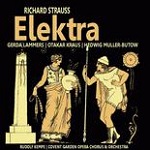 rec.
live 1958.
rec.
live 1958.
DISCOVER CLASSICAL [101:20] – from emusic.com (mp3)
I’m not sure of the provenance of this recording, never issued commercially
until Covent Garden did so on their own label in 2006, so not strictly
out of copyright. The Covent Garden CDs are no longer generally available,
so perhaps this download was made legitimately under licence. The first
things to note are that it’s a classic performance, with Strauss supremo
Rudolf Kempe directing and Gerda Lammers at the height of her powers
shortly before she retired from singing Elektra on stage and that it’s
very inexpensive - £0.84 or less from emusic.com and £1.98 from amazon.co.uk.
With a bit-rate of just 162kb/s I wasn’t very hopeful of decent sound.
It's tolerable but little more.
Bargain of the Month
 Albéric
MAGNARD (1865-1914)
Albéric
MAGNARD (1865-1914)
Symphonies Nos. 1-4; Chant funèbre; Hymne à la justice, Ouverture,
Op.10
Orchestre du Capitole de Toulouse/Michele Plasson
rec. Pathé Marconi, 1980s.
WARNER EMI 5723642 [3:09:29] – from amazon.co.uk (mp3, no booklet)
 At
£2.29 – the price of a cup of coffee, as one satisfied customer comments
– this is well worth exploring. The music of Magnard, dubbed the French
Bruckner, shows the influence of Wagner – how could it be otherwise
with the name Albéric? – but, as Milhaud said, it also breathes the
air of the French countryside. The parent CDs are no longer generally
available in the UK, so the very inexpensive download is particularly
welcome. Amazon.com, who don’t seem to offer the mp3, are asking $44,95
for the CDs – one left in stock as I write.
At
£2.29 – the price of a cup of coffee, as one satisfied customer comments
– this is well worth exploring. The music of Magnard, dubbed the French
Bruckner, shows the influence of Wagner – how could it be otherwise
with the name Albéric? – but, as Milhaud said, it also breathes the
air of the French countryside. The parent CDs are no longer generally
available in the UK, so the very inexpensive download is particularly
welcome. Amazon.com, who don’t seem to offer the mp3, are asking $44,95
for the CDs – one left in stock as I write.
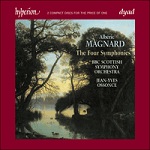 Magnard
has become better known for having been shot by a German soldier in
1914 than for his music. There are no neglected masterpieces here, but,
having owned some of these recordings when they were available on cassette,
I’m glad to make their acquaintance again. The performances are idiomatic
and the recording good, despite a variable bit-rate which rarely exceeds
256kb/s. Unless you rename the tracks, you will find that CD2 plays
first, the CD3 and finally CD1.
Magnard
has become better known for having been shot by a German soldier in
1914 than for his music. There are no neglected masterpieces here, but,
having owned some of these recordings when they were available on cassette,
I’m glad to make their acquaintance again. The performances are idiomatic
and the recording good, despite a variable bit-rate which rarely exceeds
256kb/s. Unless you rename the tracks, you will find that CD2 plays
first, the CD3 and finally CD1.
If you want better than Amazon’s mp3, at 256kb/s or less, Hyperion have an alternative for the symphonies only in the form of a 2-for-1
Dyad set, CDD22068 – review and review – download for £7.99. The performances are equally idiomatic, the recording
very good and the Hyperion comes with a pdf booklet, too.
Ottorino RESPIGHI (1879-1936)
Serenata, P34 (ed. Salvatore Di Vittorio) [4:33]
Trittico Bottcelliano (Three Botticelli Pictures, P151) [20:21]
Gli Uccelli (The Birds, P154) [20:36]
Suite in G, P58* (ed. Salvatore Di Vittorio: world premiere recording)
[21:30]
Kyler Brown (organ)*
Chamber Orchestra of New York/Salvatore Di Vittorio
rec. Church of St Jean Baptiste, Long Island, and Adelphi University
Performing Arts Center, Long Island, New York, May 2013. DDD
pdf booklet included.
NAXOS 8.573168 [67:00] – from classicsonline.com (mp3 and lossless) or eclassical.com (mp3, 16- and 24-bit lossless)
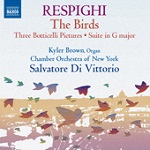 There’s
one well-known work, Gli Uccelli, made famous in the UK by a
cult antiques show on TV many years ago and highlighted in the largest
font on the cover, one less well-known, Trittico Botticelliano,
and two rarities, one receiving its first recording, to make up this
worthwhile album. As usual Respighi brought the past up to date in three
of these works, with Technicolor representations of three renaissance
paintings, employing the Advent ‘O’ antiphons and a traditional Italian
Christmas carol, (re-) orchestrations of the music of baroque composers,
and a Suite for organ and orchestra modelled on the baroque concerto
grosso.
There’s
one well-known work, Gli Uccelli, made famous in the UK by a
cult antiques show on TV many years ago and highlighted in the largest
font on the cover, one less well-known, Trittico Botticelliano,
and two rarities, one receiving its first recording, to make up this
worthwhile album. As usual Respighi brought the past up to date in three
of these works, with Technicolor representations of three renaissance
paintings, employing the Advent ‘O’ antiphons and a traditional Italian
Christmas carol, (re-) orchestrations of the music of baroque composers,
and a Suite for organ and orchestra modelled on the baroque concerto
grosso.
For the Trittico and Gli Uccelli I’d choose Tamas Vasary’s
Chandos’s 1990 recording of those two works, with the beautiful Il
Tramonto and Adagio con variazoni (CHAN8913 – from theclassicalshop.net,
mp3 and lossless: November
2008 DL Roundup) but that’s getting a little long in the tooth still
to be at full price and the new recording comes much less expensively.
It also contains the only recording of the Suite, a work which begins
in similar style to the so-called ‘Albinoni’ Adagio – actually
the work of Respighi’s contemporary, Giazotto, who claimed to have discovered
and then lost it – though it’s far less syrupy and more substantial
than the Adagio. I predict that I shall be revisiting it again
– and the rest of the album, too, for the idiomatic performances of
the two main works.
Both classicsonline.com and eclassical.com offer this download, from
the former for just £4.99 or £5.99 (mp3 and lossless respectively, the
latter presented as one long track). It’s more expensive from eclassical.com
at $12.06, but their lossless downloads are available with tracks displayed
separately, which is much more convenient and, for a little more still,
in 24-bit sound at $18.09. The COL lossless download sound is very good
– good stereo placement without any hole in the middle – but the eclassical.com
24-bit gives the music a little more body still, though at a price considerably
higher than the parent CD.
Freebie of the Month
 Nikolay
MEDTNER (1880-1971) Sonata No.2 in e minor, Op.25, ‘Night Wind’
[30:00]
Nikolay
MEDTNER (1880-1971) Sonata No.2 in e minor, Op.25, ‘Night Wind’
[30:00]
Sergey RACHMANINOV (1873-1943) Piano Transcriptions
BACH-RACHMANINOV Violin Partita No.3 in E: Prelude [3:40]
Violin Partita No.3 in E: Gavotte [2:53]
Violin Partita No.3 in E: Gigue [1:39]
SCHUBERT-RACHMANINOV Wohin ? [2:24]
MENDELSSOHN-RACHMANINOV A Midsummer Night’s Dream : Scherzo
[4:31]
TCHAIKOVSKY-RACHMANINOV Lullaby [4:29]
Sergey RACHMANINOV Polka de WR [3:56]
KREISLER-RACHMANINOV Liebesleid [4:42]
Liebesfreud [6:08]
Vadym Kholodenko (piano)
 rec.
Studio No. 5, “Kultura” National TV, Moscow, 2013 (?)
rec.
Studio No. 5, “Kultura” National TV, Moscow, 2013 (?)
pdf booklet included
DELOS DE3467 [64:19] – from theclassicalshop.net (mp3 and lossless)
The mp3 version of this recent recording is Chandos’s gift to those
who subscribe to theclassicalshop.n
et monthly newsletter. Sign up free for forthcoming issues.
With the caveat that I’m no expert in Medtner’s piano music,
I’ll merely say that I enjoyed the performance of the sonata to the
extent that I intend to try out his piano concertos from Hyperion (No.1
and Piano Quintet – CDA66744 – review; Nos. 2 and 3 – CDA66580 – review).
Maurice DURUFLÉ (1902-1986) The Complete Organ Music
Prélude sur l'Introit de l'Épiphanie Op.13 [2:42]
Prélude et Fugue sur le nom d'Alain Op.7 [11:49]
Suite pour orgue Op.5 [23:46]
Scherzo Op.2 [5:59]
Prélude, Adagio et Choral varié sur le thème du 'Veni Creator' Op.4 [22:02]
Fugue sur le thème du Carillon des Heures de la Cathédrale de Soissons Op.12 [3:11]
John Scott (organ)
rec. St Paul’s Cathedral, London, April 1989. DDD
pdf booklet included
HYPERION HELIOS CDH55475 [69:29] – from hyperion-records.co.uk (mp3 and lossless)
Fugue sur le thème du Carillon des Heures de la Cathédrale de Soissons,
Op.12 (1962) [3:45]
Prélude, Adagio et Choral Varié sur le thème de ‘Veni Creator’,
Op.4 (1930) [19:54]
Prélude sur l’Introit de l’Epiphanie, Op. l3 (1961) [2:12]
Prélude et fugue sur le nom d'Alain, Op.1 (1942) [11:15]
Scherzo, Op.2 (1926) [5:32]
Méditation, Op. posth. (1961) [3:20]
Suite, Op.5 (1933) [22:45]
Hans Fagius (1928 Frobenius organ)
Rec. Aarhus Cathedral, Denmark, April 2002. DDD
pdf booklet included
BIS BIS-CD-1304 [70:41] – from eclassical.com (mp3 and lossless)
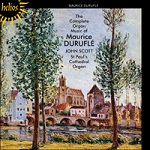
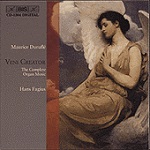 Duruflé’s
organ music is much more conservative than that of his slightly younger
contemporary Messiaen, more in the main line of descent from the nineteenth-century
masters of French music, but that certainly doesn’t make it dull. Much
of his music is inspired by Gregorian chant: most listeners will recognise
the Veni, Creator Spiritus theme which runs through Op.4.
Duruflé’s
organ music is much more conservative than that of his slightly younger
contemporary Messiaen, more in the main line of descent from the nineteenth-century
masters of French music, but that certainly doesn’t make it dull. Much
of his music is inspired by Gregorian chant: most listeners will recognise
the Veni, Creator Spiritus theme which runs through Op.4.
There are almost as many recordings of the Duruflé Requiem as
of the Fauré, which it closely resembles and with which it’s often coupled.
John Scott, the organist on one of the best of these (Hyperion CDA67070),
gives us the composer’s complete œuvre for the organ on this
budget-price Hyperion reissue. I’ve chosen Duruflé pupil Hans Fagius’s
recording from BIS as its main competitor, raising the question how
complete is complete? The eagle-eyed will have noticed that the BIS
contains one extra work, the short posthumously published Méditation,
which wasn’t known when the Helios recording was made. There are also
organ transcriptions from Bach cantatas which Duruflé made but these
are available, to the best of my knowledge, only on a recital by Olivier
Latry, Midnight at Notre Dame (DG SACD E4748162).
 Neither
of these recordings features a French organ. I didn’t find that a major
issue, but if it is, your best choice is with Henry Fairs (Naxos 8.557924:
John France’s touchstone – review),
like the Hyperion, at budget price: download from classicsonline.com (mp3) or stream from Naxos Music Library. The reeds of Fairs’ Cavaillé-Coll
organ, at Notre Dame d’Auteuil, Paris, certainly add an authentic touch,
especially in the tribute to Alain.
Neither
of these recordings features a French organ. I didn’t find that a major
issue, but if it is, your best choice is with Henry Fairs (Naxos 8.557924:
John France’s touchstone – review),
like the Hyperion, at budget price: download from classicsonline.com (mp3) or stream from Naxos Music Library. The reeds of Fairs’ Cavaillé-Coll
organ, at Notre Dame d’Auteuil, Paris, certainly add an authentic touch,
especially in the tribute to Alain.
I enjoyed listening to all three and could be very happy with any one
of them as my sole recording. The Helios and Naxos come at budget price
but of these only the Helios is available in lossless sound. The BIS,
which costs a little more, is also available in lossless sound and contains
that short extra work, which is also included on the Naxos alongside
another yet shorter addition, Hommage à Jean Gaillon. All three
performances are idiomatic, all the recordings sound very well, allowing
for mp3 limitations, which don’t unduly inhibit the COL download, and
all come with pdf booklets as part of the deal.
In the unlikely event that none of these suit – you can check them all
out for yourself via Naxos Music Library – there are other recordings
of individual works and even quite a few of the complete organ music:
Todd Wilson (Delos), Frédéric Ledroit (Skarbo), Friedhelm Flamme (CPO
– review)
and Kristian Krogsoe (Danacord). There’s also an even less expensive
2-CD set from Brilliant Classics of the complete music for choir and
organ (Adriano Falcioni, Benjamin Saunders and Daniel Justin with the
choir of Leeds Cathedral). I reviewed a recording of three of Duruflé’s
organ works, with music by Alain, on Tower Hill Recordings – review – and concluded, reluctantly, that it was uncompetitive with so many
really fine recordings of the complete organ opus of both composers.
If, rather than the complete Duruflé, you prefer to have some of his
organ music and that of his friend Jehan Alain, you would best be directed
to Dances of Life and Death: Chandos CHAN10315 –
review and DL
Roundup April 2009. Incredibly, that’s available on CD only from
the Chandos Archive Service but the download remains available in mp3
or lossless sound from theclassicalshop.net. Olivier Latry’s Intégrale of Duruflé on the BNL label is also
available only as a download – 7digital.com.
Dmitri SHOSTAKOVICH (1906-1975) Piano Trio No.1 in c minor, Op.8
(1923) [13:48]
Maurice RAVEL (1875-1937) Piano Trio in a minor, M67 (1914) [28:39]
Dmitri SHOSTAKOVICH Piano Trio No.2 in e minor, Op.67 (1944)
[25:42]
Smetana Trio
rec. Martínek Studio, Prague, 19-22 September and 11-14 December, 2013.
DDD.
SUPRAPHON SU41452 [68:10] – from emusic.com (mp3, no booklet)
 All
the recordings that I’ve heard from this award-winning youthful trio
so far have been first class. Apart from their recent Brahms, which
I haven’t heard, they have been on ‘home’ territory so far, with at
least one piece by a Czech composer on each album, but here they stray
further abroad with performances of trios by Ravel and Shostakovich,
both of which are hotly contested territory and the latter’s less well-known
single-movement first Piano Trio, a remarkably mature work for a 17-year-old.
All
the recordings that I’ve heard from this award-winning youthful trio
so far have been first class. Apart from their recent Brahms, which
I haven’t heard, they have been on ‘home’ territory so far, with at
least one piece by a Czech composer on each album, but here they stray
further abroad with performances of trios by Ravel and Shostakovich,
both of which are hotly contested territory and the latter’s less well-known
single-movement first Piano Trio, a remarkably mature work for a 17-year-old.
I said that the Shostakovich Op.8 was less well known but there is very
strong competition from the Florestan Trio who combine Op.8 and Op.67
withSeven Romances on Verses by Alexander Blok, sung by Susan
Gritton (Hyperion CDA67834: Recording of the Month –
review andDL
Roundup June 2011/1: Download in mp3 and lossless from hyperion-records.co.uk).
The Florestan Trio, again on Hyperion, also provide the strongest competition
in Ravel: with Fauré and Debussy (CDA30029 – October
2010 DL Roundup: mp3, 16- and 24-bit lossless from hyperion-records.co.uk).
For all the strength of the competition, however, if it’s these three
works on one album that you were looking for, you have come to the right
place: I’d be hard find fault with this new recording. The emusic.com
download comes at a variable – decent but not brilliant – bit-rate,
averaging around 225kb/s.
Dmitri SHOSTAKOVICH (1906-1975) String Quartets: Volume 4
String Quartet No.10 in A ?at, Op.118 [23:42]
String Quartet No.12 in D ?at, Op.133 [25:41]
String Quartet No.14 in F sharp, Op.142 [26:01]
Mandelring Quartett (Sebastian Schmidt, Nanette Schmidt (violin); Roland
Glassl (viola); Bernhard Schmidt (cello))
No booklet
AUDITE 92.529 [75:33] – from audite.de (SACD, mp3, 16- and 24-bit lossless and surround) or stream from Naxos
Music Library
• Comparative version, identically coupled: Hyperion CDA67156 – St Petersburg Quartet [70:52] – from hyperion-records.co.uk (mp3 and lossless) – also available as a 6-CD box set, CDS44091/6 – download only, from hyperion-records.co.uk (mp3 and lossless).
• Nos. 12 and 14: Cédille CDR90000-145 – Pacifica
Quartet (with Nos. 13 and 15 and SCHNITTKE String Quartet No.3) – from eclassical.com (mp3, 16- and 24-bit lossless). See review of live performance of Nos. 11, 13-15 by George Grella.
• No.10: Alto ALC1112 (budget-price CD) Shostakovich
Quartet (with Nos. 4 and 8)
• Nos. 12 and 14: Alto ALC2013 (2 budget-price CDs)
Shostakovich Quartet (with Nos. 6, 11, 13 and 15)
• No.14: Chandos CHAN10114 – Sorel String Quartet
(with No.2)
Though by no means offering the best sound – 1980s Russian vintage –
the two Alto recordings are my benchmarks for these quartets:
you should be able to find the single CD for around £5 and the 2-CD
set for around £8.50. Whatever other recordings you have or intend to
buy, snap these up while they are still on offer – Regis and Alto CDs
have a habit of disappearing from the catalogue and these have already
switched from the defunct Olympia label via Regis to Alto. Only the
rather crudely designed covers let the show down: even the less than
ideal recording somehow sounds appropriate for the music.
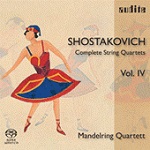
 Like
all the volumes in the series, the Audite recording features
a ballerina on the cover – the same ballerina on each, making them hard
to tell apart – but that’s the only aspect of this latest album that
isn’t true to the quality of the music. Jens F. Laursen thought the
previous, third, volume of the series a treasure – review – and that’s no less true of the recent release. These performances
bring out the power of the music and also its more beautiful aspects
– like the late Beethoven quartets, this is quirky and unpredictable
music which places considerable demands on the performers to capture
its restless temperament. The recording, especially in 24-bit format,
albeit that it’s only 24/44.1, sounds very fine. I haven’t heard the
surround-sound version.
Like
all the volumes in the series, the Audite recording features
a ballerina on the cover – the same ballerina on each, making them hard
to tell apart – but that’s the only aspect of this latest album that
isn’t true to the quality of the music. Jens F. Laursen thought the
previous, third, volume of the series a treasure – review – and that’s no less true of the recent release. These performances
bring out the power of the music and also its more beautiful aspects
– like the late Beethoven quartets, this is quirky and unpredictable
music which places considerable demands on the performers to capture
its restless temperament. The recording, especially in 24-bit format,
albeit that it’s only 24/44.1, sounds very fine. I haven’t heard the
surround-sound version.
I’m surprised to see that the identical coupling on Hyperion,
highly and justly praised when first released, is now available only
as a download and to special order on CD from the Archive Service. The
Petersburg Quartet, too, capture the beauty and intensity of the music.
I echoed Neil Horner’s praise of these performers in Nos. 11, 13 and
15 (CDA67157 – January
2011) and that holds good for this volume. With identical programmes,
honours are about even between this and the Audite – the Hyperion comes
with a pdf booklet and the lossless flac, usually £7.99, is discounted
to £6 as I write, but the Audite is additionally available in 24-bit
and surround sound.
Samuel BARBER (1910-1981)
Violin Concerto, Op.14 [23:02]
Souvenirs – ballet suite, Op.28 [20:43]
Serenade for Strings, Op.1 [10:45]
Music for a Scene from Shelley, Op.7 [9:49]
James Buswell (violin)
Royal Scottish National Orchestra/Marin Alsop
rec. May 1999 - January 2001. DDD
pdf booklet included
2xHDNA2021 (still also available as Naxos 8.559044) [64:19]
– from eclassical.com (mp3, 16- and 24-bit lossless)
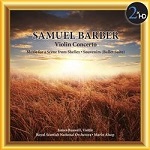 For
the most part 2xHD are choosing some of Naxos’s finest recordings for
the 24-bit treatment and this, like Marin Alsop’s recording of the Barber
symphonies (2xHDNA2013 – see 2014/6),
is certainly among the best versions of his beautiful Violin Concerto
– review and review.
I shan’t be throwing away Isaac Stern (with Piano Concerto, etc, CBS/Sony
– review:
now on 88697529892 ), inevitably sounding a little dated but
still very serviceable and available on CD for around £4. Nor am I overlooking
the virtues of the recording of the Barber, Bernstein and Bloch Violin
Concertos on BIS-SACD-1662 (Vadim Gluzman; São Paolo SO/John
Neschling – review:
download from eclassical.com,
mp3, 16- and 24-bit lossless, with pdf booklet).
For
the most part 2xHD are choosing some of Naxos’s finest recordings for
the 24-bit treatment and this, like Marin Alsop’s recording of the Barber
symphonies (2xHDNA2013 – see 2014/6),
is certainly among the best versions of his beautiful Violin Concerto
– review and review.
I shan’t be throwing away Isaac Stern (with Piano Concerto, etc, CBS/Sony
– review:
now on 88697529892 ), inevitably sounding a little dated but
still very serviceable and available on CD for around £4. Nor am I overlooking
the virtues of the recording of the Barber, Bernstein and Bloch Violin
Concertos on BIS-SACD-1662 (Vadim Gluzman; São Paolo SO/John
Neschling – review:
download from eclassical.com,
mp3, 16- and 24-bit lossless, with pdf booklet).
$17.37 may seem rather steep for a 24-bit version of a recording which
you can buy on CD for around £6, and when the 24-bit download of the
BIS recording can be yours for $14.48, but the Naxos recording has come
up sounding very well in the higher format. On the other hand, the 16-bit
and mp3 versions at $11.58 do really seem expensive when compared with
the CD or classicsonline.com’s £4.99 download of the Naxos (mp3 only).
Mieczyslaw WEINBERG (1919-1996)
Trumpet Concerto, Op.94 (1966-67)* [26:05]
Symphony No. 18 ‘War – there is no word more cruel’, Op.138 (1982-84)† [44:21]
Andrew Balio (trumpet)*
Tatyana Perevyazkina (soprano), Ekaterina Shikunova (alto), Vladimir
Dobrovolsky (tenor), Zahar Shikunov (baritone); St Petersburg Chamber
Choir†
St Petersburg State Symphony Orchestra/Vladimir Lande
rec. St Catherine Lutheran Church, St Petersburg, Russia, 25 and 27
December, 2010, 29 and 30 December, 2012, and 9-11 January, 2013. DDD.
pdf with transliterated Russian poems by Sergey Orlov and English translations
included.
NAXOS 8.573190 [70:26] – from classicsonline.com or eclassical.com (both mp3 and lossless) or stream from Naxos Music Library
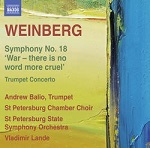 Naxos
seem to be working their way through the Weinberg symphonies: in addition
to No.8 conducted by Antoni Wit (8.572873 – review and review)
they already have Nos. 6, 12 and 19 with Vladimir Lande at the helm
on 8.572779 – review – 8.573085 – review – and 8.572752 – review and review – respectively. Even the Trumpet Concerto which opens the proceedings
is a powerful work, while the symphony forms the heart of a trilogy
of compositions on the sufferings of the USSR in World War II.
Naxos
seem to be working their way through the Weinberg symphonies: in addition
to No.8 conducted by Antoni Wit (8.572873 – review and review)
they already have Nos. 6, 12 and 19 with Vladimir Lande at the helm
on 8.572779 – review – 8.573085 – review – and 8.572752 – review and review – respectively. Even the Trumpet Concerto which opens the proceedings
is a powerful work, while the symphony forms the heart of a trilogy
of compositions on the sufferings of the USSR in World War II.
There is no other recording of the symphony in the UK catalogue: it
hasn’t (yet?) appeared in the Chandos series of recordings of Weinberg.
With nothing for comparison, I can only say that, as on the earlier
albums, the performances are idiomatic and the recordings generally
good.
The classicsonline.com download is inexpensive, that from eclassical.com
a little dearer in the UK than the CD, but the latter comes with tracks
presented separately, as also does the COL mp3, but the COL lossless
comes in one less convenient dollop.
For Weinberg in his sweeter-toothed Violin Concerto, coupled with the
even sweeter Conus and Arensky concertos, there’s another Naxos recording
on 8.572631 – see DL
Roundup October 2011/2. As I predicted then, this has now appeared
in lossless form from eclassical.com; at $11.66, it’s more expensive
than the CD in the UK, though not necessarily in the US.
Springtime
The First Day of Spring – Leroy Anderson and His Orchestra* [3:09]
April is Coming – Ron Goodwin and His Concert Orchestra* [3:02]
Tip Toe through the Tulips with me – Frank Chacksfield and His Orchestra
[3:09]
Blossom – Richard Hayman and His Orchestra [2:26]
Spring in Baden Baden – Baden-Baden Symphony Orchestra/Hans Rosbaud
[2:34]
Springtime – The Bosworth Orchestra [3:12]
Mayflies – New Concert Orchestra/Dolf van der Linden [3:15]
Spring Cruise – Danish State Radio Orchestra/Robert Farnon [2:48]
Spring Gambol – The Light Symphonia/Roberto Capelli [2:20]
Mother Nature – New Concert Orchestra/ Dolf van der Linden [3:43]
Garden Party – L’Orchestra Devereaux/Georges Devereaux [1:59]
Those Far Away Hills – Regent Classic Orchestra [3:01]
Spring Promenade – New Concert Orchestra/Cedric Dumont [3:43]
Rainbow’s Glory – Dolf van der Linden and His Metropole Orchestra [2:49]
High Cloud – Crawford Light Orchestra [2:52]
Spring Fashion – Group-Forty Orchestra/Laurie Johnson [2:38]
Spring Song – Queen’s Hall Light Orchestra/Charles Williams [2:26]
Prelude for Gardenias – New Concert Orchestra/Jack Leon [3:30]
Forest Mood – The Bosworth Orchestra [2:43]
June Is Calling – New Concert Orchestra/Jay Wilbur [3:26]
April Kiss – Dolf van der Linden and His Metropole Orchestra [3:13]
(I’ll be with you) In Apple Blossom Time – Ernest Maxin and His Orchestra
[2:56]
Sunbeams and Butterflies (Ketèlbey) – Elite Novelty Orchestra [2:42]
We’ll Gather Lilacs – Queen’s Hall Light Orchestra/Charles Williams
[4:59]
Beautiful Spring – London Promenade Orchestra/Eric Rogers [3:57]
rec. 1938-1962. ADD mono/stereo*
pdf booklet included
GUILD LIGHT MUSIC GLCD5216 [77:54] – from theclassicalshop.net (mp3 and lossless)
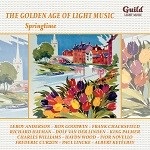
Guild seem to have tapped into an endless supply of first-class vintage
recordings of light music, in this case more recent than many, dating
from 1938 to 1962, with the majority of the recordings from the 1950s,
the first two items being in stereo. With composers such as Leroy Anderson,
Haydn Wood, Ivor Novello, Frederic Curzon and Alfred Ketèlbey, performances
by some of the top ensembles and conductors of light music of the time,
including the ‘Guvnor’ himself, Robert Farnon, and well-refurbished
recording, all for £4.99 (mp3) or £7.99 (lossless), you can’t go wrong.
Even though it’s Summer now, not Spring, light music of this quality
is never out of season, so this is another very welcome release in the
series.
Harmonies d’un Soir: Piano à quatre mains
Antonín DVOŘÁK (1841-1904) Ze Šumavy ‘From the Bohemian
forest’, Op.68/1, 2 and 6 [16:40]
Franz SCHUBERT (1797-1828) Rondo in A, D951 [12:46]
Allegro in a minor ‘Lebensstürme’, D947 [13:04]
Maurice Ravel (1875-1937) Ma mère l’oye [15:33]
John PITTS (b.1976) Raag Gezellig [11:36]
Duo Bohêmes (Aurélie Samani and Gabriela Ungureanu (piano))
rec. L’Espace Jéliote d’Oloron-Sainte-Marie, France, February 2012.
DDD
pdf booklet included
1 EQUAL MUSIC 1EMHDUS [69:39] – from hyperion-records.co.uk (mp3 and lossless)
 This
recital of pieces for four hands contains some music I had never heard
before, including the opening three fine pieces from Ze Šumavy ‘From the Bohemian Forest’ by Dvořák. The first of these is colourful
and rhythmical and the second, ‘By the Black Lake’ is quite an extensive,
large-scale piece. It is expressively played by our pianists who build
the work to a fine climax. No 6 is given next and this is the final
piece of the collection. I really enjoyed hearing these works and they
make a nice change from the Slavonic Dances, which is what we
normally hear when Dvořák’s music is included in four-handed piano
recitals.
This
recital of pieces for four hands contains some music I had never heard
before, including the opening three fine pieces from Ze Šumavy ‘From the Bohemian Forest’ by Dvořák. The first of these is colourful
and rhythmical and the second, ‘By the Black Lake’ is quite an extensive,
large-scale piece. It is expressively played by our pianists who build
the work to a fine climax. No 6 is given next and this is the final
piece of the collection. I really enjoyed hearing these works and they
make a nice change from the Slavonic Dances, which is what we
normally hear when Dvořák’s music is included in four-handed piano
recitals.
The Dvořák is followed by a more familiar work, Schubert’s substantial Rondo in A, D951. This is attractively played by Duo Bohêmes.
There is great attention to detail and every note is carefully placed
in the texture. The pedalling is sparing, allowing for great clarity
but there is little feeling of the warmth I generally associate with
Schubert performance. I would like to hear a greater dynamic range,
but this is a fine performance, nevertheless. Considerably quicker and
more flowing are Imre Rohmann and András Schiff on Hungaroton.
They make greater contrasts between the louds and softs with rather
more effective rubato, and they build great tension when appropriate.
I like the strong and rhythmic attack in the next piece, Schubert’s Allegro in a minor, D947. Duo Bohêmes are well up for the virtuosic
challenges presented here and they give a very exciting performance.
Good though this is, Alfred Brendel and Evelyne Crochet on Vox give
a much more impassioned and characterful performance with a wider variety
of tone, colour, dynamics and articulation. I prefer Brendel and Crochet’s
approach to the song-like, lyrical passages. Masterly! This is how Schubert
should be played.
Though best known in orchestral form, Ravel’s Ma Mère L’oye,
was originally conceived as a piano duet. My first feeling on hearing
the opening Pavane was that the recording seemed a little dry
and the performance a bit matter-of-fact. However, Petit Poucet is beautifully phrased even in the opening and closing accompanying
passages. In No.3, I felt that the accompaniment was a little too loud
but as in No.4 the players give fairly characterful accounts with good
build-up to the climaxes. The final piece, Le jardin féerique is well-played with great clarity, I have a preference for a rather
more romantic approach, which I feel would sometimes be more appropriate
in this music. The performance by Duo Bohêmes seems a little soulless
to me. Martha Argerich’s recording captures the atmosphere of a superb
live performance and great occasion and it is well-worth hearing, but
for me at least, it is too idiosyncratic for repeated hearings. Louis
Lortie and Hélène Mercier on Chandos are so much more expressive than
Duo Bohêmes, with excellent balance between the two pianists, great
imagination in tone colouring, and they capture the mood very successfully
in every piece in this work. This is the one to go for!
The real interest on this disc for me is the piece by John Pitts entitled Raag Gezellig. According to the well-written and informative
programme notes, the piece draws heavily on the classical sitar raag tradition of Pakistan. It begins quietly and atmospherically in the
depths of the piano. These gentle murmurings soon become ominous and
the first pianist joins in with melodic fragments which become gradually
more aggressive, not to mention highly virtuosic and improvised-sounding.
Soon we hear some extensive melodic lines at a faster pace. Some melodies
are pre-composed, other sections are semi-improvised. It all builds
to a grand and magnificent climax followed by a short, gentle and effective
conclusion. I was made aware from the disc of Piano Music by John Pitts
which I reviewed some time ago, that here is a composer who has something
of real interest to say. All the pieces I have heard so far are really
characterful and imaginative and Raag Gezellig is no exception.
The piece by John Pitts is well-worth investigating and it is brilliantly
played here by Duo Bohêmes. Also the Dvořák pieces are particularly
enjoyable. However, the rest of the music, though expertly played here
has been oft-recorded, and I have mentioned my preferences for the Ravel
and Schubert above.
Geoffrey Molyneux
BEULAH REISSUES
 1PD91 : The Art of J.S.BACH offers a cross-section of his music: the Concerto in a minor, for flute, violin and harpsichord, BWV1044
– Soloists with the Philomusica of London/Thurston Dart – Cantata
No.170, Vergnügte Ruh – directed by Szymon Goldberg – Keyboard
Partita No.3, BWV827 – Ralph Kirkpatrick, harpsichord – and the Toccata and Fugue in F, BWV540– Ralph Downes at the Royal Festival
Hall organ. Download in aac from iTunes.
1PD91 : The Art of J.S.BACH offers a cross-section of his music: the Concerto in a minor, for flute, violin and harpsichord, BWV1044
– Soloists with the Philomusica of London/Thurston Dart – Cantata
No.170, Vergnügte Ruh – directed by Szymon Goldberg – Keyboard
Partita No.3, BWV827 – Ralph Kirkpatrick, harpsichord – and the Toccata and Fugue in F, BWV540– Ralph Downes at the Royal Festival
Hall organ. Download in aac from iTunes.
Thurston Dart’s Bach is still well worth hearing – with the Philomusica
he was one of the first who removed JSB’s music far from the stodgy
old style which had prevailed – and Richard Adeney (flute) and Granville
Jones (violin) contribute accomplished solos. Beulah don’t give a date
but the Oiseau-Lyre recording was released in mono in 1958 to an unjustifiably
sniffy welcome. The stereo, which followed two years later, still sounds
well. This is also available on Beulah Extra 4BX69.
Szymon Goldberg was another pioneer of less stodgy Bach and Aafje Heynis
(contralto) was on the top of her form, albeit sounding a trifle plummy
for my taste, when Philips made this recording of Cantata 170, released
in 1961. With fine support from the Netherlands CO, whom I remember
in several Goldberg recordings, and recording that still sounds well,
this, too, is of much more than historical interest. It remains available
also on Beulah Extra 1BX107 – DL
Roundup February 2011.
Messrs Kirkpatrick and Downes round off a worthwhile reissue – the former
is also on 2BX89, the latter also available on Beulah Extra 3BX67.
Both were reviewed in DL
Roundup December 2010 and both date from 1958.
 1PD92:
Ludwig van BEETHOVEN Choral Music contains the Mass in C,
Op.86 – Catherine Graf (soprano), Hanna Schaer (contralto), Olivier
Dufour (tenor), Etienne Bettens (bass), Chœur Mixte de Bulle, Collegium
Academicum de Genève/Robert Dunand – and the Cantata on the Death
of Emperor Joseph II, WoO87, performed by Constanza Cuccaro (soprano),
Andrew Foldi (baritone), Gemischte Chor, Zürich, and Monte Carlo Opera
Orchestra/David Josefowitz. Download in aac from iTunes.
1PD92:
Ludwig van BEETHOVEN Choral Music contains the Mass in C,
Op.86 – Catherine Graf (soprano), Hanna Schaer (contralto), Olivier
Dufour (tenor), Etienne Bettens (bass), Chœur Mixte de Bulle, Collegium
Academicum de Genève/Robert Dunand – and the Cantata on the Death
of Emperor Joseph II, WoO87, performed by Constanza Cuccaro (soprano),
Andrew Foldi (baritone), Gemischte Chor, Zürich, and Monte Carlo Opera
Orchestra/David Josefowitz. Download in aac from iTunes.
I can’t help you with the dates and provenance of these two recordings,
which I don’t believe were ever commercially released in the UK except
as imports. The only recording that I can trace by the Collegium Academicum
and Robert Dunand was of Rousseau’s Le Devin du Village, for
CBS. The major work, the Mass in C, is much less often performed than
its big brother, the Missa Solemnis, with which it’s paired on
a budget EMI/Warner twofer in performances by Carlo Maria Giulini –
worth having for the Mass in C, slightly less so for its big brother.
There are also highly-regarded historically-aware performances under
Sir John Eliot Gardiner (DG Archiv) and Richard Hickox (Chandos).
The Beulah performance is very decent but it’s a trifle stodgy and the
recording is rather dry. I’d choose one of the recordings that I’ve
already mentioned or the budget Hyperion Helios recording directed by
Matthew Best (CDH55263 – review by John Quinn – from hyperion-records.co.uk,
mp3 and lossless, with pdf booklet).
If the Mass in C is comparatively rare, the early cantata commemorating
the death of Emperor Joseph II, composed at the age of 19, is even more
so. Here again the performance is decent but slightly stodgy and the
sound rather dry. More serious is the lack of the text, which is provided
with Matthew Best’s recording on Hyperion and coincidentally this is
due for reissue on the budget Helios label in August 2014, but available
for download now (CDH55749, with Cantata on the Accession
of Leopold II, Opferlied and Meeresstille und glückliche
Fahrt – from hyperion-records.co.uk,
mp3 and lossless).
 1PD94:
Music of Scandinavia: Volume 1 combines the familiar – Edvard
GRIEG Piano Concerto in a minor, performed by Clifford Curzon
with the LSO and Anton Fistoulari (1951, mono) and Hans Christian
LUMBYE Kjøbenhavns Jernban Damp Galop or Copenhagen Steam
Railway Galop (Copenhagen SO/Lavard Frisholm, 1960) with the much less
familiar Johan Peter Emilius HARTMANN Håkon Jarl Overture,
Op.40 (Danish State RSO/John Frandsen, 1958) and Kurt ATTERBERG Symphony No.6 in C, Op.31 (RPO/Sir Thomas Beecham, 1928).
1PD94:
Music of Scandinavia: Volume 1 combines the familiar – Edvard
GRIEG Piano Concerto in a minor, performed by Clifford Curzon
with the LSO and Anton Fistoulari (1951, mono) and Hans Christian
LUMBYE Kjøbenhavns Jernban Damp Galop or Copenhagen Steam
Railway Galop (Copenhagen SO/Lavard Frisholm, 1960) with the much less
familiar Johan Peter Emilius HARTMANN Håkon Jarl Overture,
Op.40 (Danish State RSO/John Frandsen, 1958) and Kurt ATTERBERG Symphony No.6 in C, Op.31 (RPO/Sir Thomas Beecham, 1928).
This album is due shortly from iTunes along with two other volumes of
Music of Scandinavia which I hope to review next time. For the classic
recording of the Grieg please see below for a Beulah Korean release, Classic Grieg.
With only one current recording of the Hartmann work in the catalogue
(Danacord) – not to be confused with the music of the better-known Karl
Amadeus Hartmann – this reissue from a Philips 10” LP is very welcome.
The other half of that LP, Gade’s Ossian, will follow on Volume
2.
There are more modern recordings of the Atterberg symphony but Beecham’s
recording of the work soon after it won a prize offered by Columbia
records – the then considerable sum of £2,000 – is very special and
the recording has come up unbelievably well for its age (1928). The
recording was not released until 1933 on eight 78 sides when it earned
a most perceptive review – if you have access to the Gramophone archive, it’s well worth looking it up in the July 1933 edition, a detailed
analysis which puts modern reviews to shame, especially as the last
(2012) edition of that magazine’s Classical Music Guide didn’t
even have an entry for Atterberg: quantum mutatus ab illo. Those
able to purchase from Korea will also find the symphony included in
a Beecham album reviewed below.
The Lumbye has a long name for such a short and enjoyable work – the
Copenhagen railway only ran a few miles at the time. If you like the
music and the performance, as I think you will, you may wish to follow
up with the single Naxos CD extracted from Marco Polo’s recordings of
his music (8.556843: Bargain of the Month – review and review.)
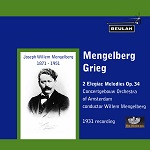 BEULAH
EXTRA 1BX243: Edvard GRIEG Two Elegiac Melodies, Op.34, performed
by the Concertgebouw Orchestra, conducted by Willem Mengelberg in 1931.
BEULAH
EXTRA 1BX243: Edvard GRIEG Two Elegiac Melodies, Op.34, performed
by the Concertgebouw Orchestra, conducted by Willem Mengelberg in 1931.
This is music of heartfelt intensity and the power of Mengelberg’s interpretation
shines through the recording quality, which is rather crumbly even for
its age. Sometimes these two pieces are played with too much emotion
but Mengelberg keeps them under control without diminishing their appeal
– as one reviewer expressed it, quaintly but aptly, in 1932, the music
doesn’t ‘yearn overmuch’. We don’t write like that anymore.
NB: This recording will also feature as part of 3PD94 Music of Scandinavia 3, due shortly from iTunes.
Now that the EU law of copyright has been tightened, Beulah have decided
to shift some of the attention elsewhere: the following are released
in Korea only, though some of the component parts are also available
in the UK. The complete list is too large for one review, so I’ll single
out a few items and return for the rest later. All are available from kr.eavb.co.uk.
 1BX2K:
Edvard GRIEG Classic Grieg: The chief appeal here comes in the form
of Clifford Curzon’s performance of the Piano Concerto in a minor,
Op.16, with the LSO and Anatole Fistoulari, from 1951. Curzon’s stereo
remake with Øivin Fjeldstad remains my benchmark for this work but the
earlier mono recording has come up sounding well and is also well worth
hearing. I have already welcomed its UK release on Beulah Extra 6-8BX7 –October
2011/1 DL Roundup. The coupling, Norwegian Dances 1-4, dates
from 1949 – the LSO again with Piero Coppola. Inevitably the sound is
rather more muffled than in the concerto, but perfectly acceptable and
there is little or no 78 surface noise.
1BX2K:
Edvard GRIEG Classic Grieg: The chief appeal here comes in the form
of Clifford Curzon’s performance of the Piano Concerto in a minor,
Op.16, with the LSO and Anatole Fistoulari, from 1951. Curzon’s stereo
remake with Øivin Fjeldstad remains my benchmark for this work but the
earlier mono recording has come up sounding well and is also well worth
hearing. I have already welcomed its UK release on Beulah Extra 6-8BX7 –October
2011/1 DL Roundup. The coupling, Norwegian Dances 1-4, dates
from 1949 – the LSO again with Piero Coppola. Inevitably the sound is
rather more muffled than in the concerto, but perfectly acceptable and
there is little or no 78 surface noise.
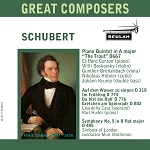 Clifford
Curzon’s recording of SCHUBERT’s Trout Quintet on 2BX190K is also very worthwhile: recorded with members of the
Vienna Octet, it’s already available in the UK on Beulah Extra 1-3BX41 – August
2010 DL Roundup. Audiophiles may wish to consider paying extra for
the HDTT 24-bit transcription of this recording – February
2012/2 DL Roundup – but the Beulah will do fine for most listeners.
One or the other is almost mandatory now that the Decca reissue is imprisoned
in a 23-CD box. Lisa della Casa sings four Schubert Lieder and the album
is rounded off with the Sinfonia of London conducted by Muir Mathieson
in a stylish performance of Symphony No.5 in B-flat, D485, from 1959
– also available on Beulah Extra 1BX93: November
2010 DL Roundup.
Clifford
Curzon’s recording of SCHUBERT’s Trout Quintet on 2BX190K is also very worthwhile: recorded with members of the
Vienna Octet, it’s already available in the UK on Beulah Extra 1-3BX41 – August
2010 DL Roundup. Audiophiles may wish to consider paying extra for
the HDTT 24-bit transcription of this recording – February
2012/2 DL Roundup – but the Beulah will do fine for most listeners.
One or the other is almost mandatory now that the Decca reissue is imprisoned
in a 23-CD box. Lisa della Casa sings four Schubert Lieder and the album
is rounded off with the Sinfonia of London conducted by Muir Mathieson
in a stylish performance of Symphony No.5 in B-flat, D485, from 1959
– also available on Beulah Extra 1BX93: November
2010 DL Roundup.
 Great
Conductors: Carlo Maria Giulini, recorded in 1958-9, conducts the
Philharmonia Orchestra in BOCCHERINI Overture in D, HAYDN Symphony No.94 (Surprise) and RAVEL Daphnis
and Chloë Suite No.2 on 1BX8K. The stylish performances of
Boccherini and Haydn appeared with the Boccherini Symphony in c minor on Columbia 33CX1539 and the Ravel with Alborada and excerpts
from Falla’s Three-cornered Hat on 33CX1694/SAX2341. The Falla/Ravel
LP became something of a classic and I’m pleased to see everything here
now made available to East Asian purchasers. With good recording quality,
they should find everything very much to their liking – a good substitute
for the UK LPs which I know many like to snap up and much more convenient
than the 17-CD Warner box where these recordings are otherwise imprisoned.
My only reservation is that Giulini’s performance of the Ravel is so
fine that you will want the whole score, of which Suite No.2 is less
than half.
Great
Conductors: Carlo Maria Giulini, recorded in 1958-9, conducts the
Philharmonia Orchestra in BOCCHERINI Overture in D, HAYDN Symphony No.94 (Surprise) and RAVEL Daphnis
and Chloë Suite No.2 on 1BX8K. The stylish performances of
Boccherini and Haydn appeared with the Boccherini Symphony in c minor on Columbia 33CX1539 and the Ravel with Alborada and excerpts
from Falla’s Three-cornered Hat on 33CX1694/SAX2341. The Falla/Ravel
LP became something of a classic and I’m pleased to see everything here
now made available to East Asian purchasers. With good recording quality,
they should find everything very much to their liking – a good substitute
for the UK LPs which I know many like to snap up and much more convenient
than the 17-CD Warner box where these recordings are otherwise imprisoned.
My only reservation is that Giulini’s performance of the Ravel is so
fine that you will want the whole score, of which Suite No.2 is less
than half.
UK readers and others need not despair: Beulah Extra already have the
Ravel on 3BX8 – February
2012/2 DL Roundup – the Boccherini on 1BX8 and the Haydn
on 2BX8 – both reviewed in June
2010 DL Roundup.
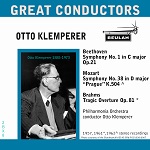 Great
Conductors: Otto Klemperer appears in early BEETHOVEN, Symphony
No.1 in C, Op.21, MOZART Symphony No.38 (Prague)
and BRAHMS Tragic Overture, Op.81 on 2BX8K, recorded
in 1957, 1962 and 1961 respectively. Klemperer’s Brahms is a particular
favourite of mine – his recordings of all four symphonies remain my
benchmarks – but his Beethoven also has classic status and his Mozart
is much lighter than you may imagine. For all Klemperer’s reputation
he doesn’t beef up the Beethoven too much – the lineage from Haydn and
Mozart remains clear – and the Mozart sounds almost too lightweight,
though that’s due to the lack of repeats rather than fast tempi.
Great
Conductors: Otto Klemperer appears in early BEETHOVEN, Symphony
No.1 in C, Op.21, MOZART Symphony No.38 (Prague)
and BRAHMS Tragic Overture, Op.81 on 2BX8K, recorded
in 1957, 1962 and 1961 respectively. Klemperer’s Brahms is a particular
favourite of mine – his recordings of all four symphonies remain my
benchmarks – but his Beethoven also has classic status and his Mozart
is much lighter than you may imagine. For all Klemperer’s reputation
he doesn’t beef up the Beethoven too much – the lineage from Haydn and
Mozart remains clear – and the Mozart sounds almost too lightweight,
though that’s due to the lack of repeats rather than fast tempi.
 Great
Conductors: Sir Charles Mackerras could turn his hand to many things
– his mature Mozart Symphonies (Linn and Telarc) and Beethoven Symphonies
(Hyperion) among the very best – but two of his great talents were in
making light music sound important and in interpreting Czech music.
On 3BX8K his SULLIVAN confection Pineapple Poll with the RPO is infectious, even for someone like me who isn’t very
keen on the Savoy operettas. He even makes me like WEINBERGER’s Schwanda the Bagpiper, but it’s his recording of JANÁČEK’s Sinfonietta with the Pro Arte Orchestra that is the highlight
of this album – see my review of this recording on Beulah Extra 1BX278, DL
News 2013/11. All these recordings were made in very decent stereo,
between 1959 and 1962, and still sound well in these transfers.
Great
Conductors: Sir Charles Mackerras could turn his hand to many things
– his mature Mozart Symphonies (Linn and Telarc) and Beethoven Symphonies
(Hyperion) among the very best – but two of his great talents were in
making light music sound important and in interpreting Czech music.
On 3BX8K his SULLIVAN confection Pineapple Poll with the RPO is infectious, even for someone like me who isn’t very
keen on the Savoy operettas. He even makes me like WEINBERGER’s Schwanda the Bagpiper, but it’s his recording of JANÁČEK’s Sinfonietta with the Pro Arte Orchestra that is the highlight
of this album – see my review of this recording on Beulah Extra 1BX278, DL
News 2013/11. All these recordings were made in very decent stereo,
between 1959 and 1962, and still sound well in these transfers.
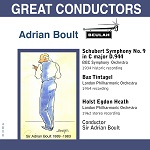 4BX8K:
Great Conductors: Sir Adrian Boult’s 1934 recording of SCHUBERT’s
‘Great’ Symphony No.9 in C, D, with the BBCSO, was already available
in the UK on Beulah 20-23BX12, a fresh and sparking performance
in sound that belies its age – DL
Roundup October 2010. The fillers are treasurable performances
of BAX’s Tintagel and HOLST’s Egdon Heath,
both with the LPO from 1954 and 1962 respectively. Egdon Heath,
also available on 47BX12 – DL
News 2013/11* – is a particular favourite of mine and no-one does
it better than Boult. (* NB: for 1952, read 1962. Monsieur Typo at work again.)
4BX8K:
Great Conductors: Sir Adrian Boult’s 1934 recording of SCHUBERT’s
‘Great’ Symphony No.9 in C, D, with the BBCSO, was already available
in the UK on Beulah 20-23BX12, a fresh and sparking performance
in sound that belies its age – DL
Roundup October 2010. The fillers are treasurable performances
of BAX’s Tintagel and HOLST’s Egdon Heath,
both with the LPO from 1954 and 1962 respectively. Egdon Heath,
also available on 47BX12 – DL
News 2013/11* – is a particular favourite of mine and no-one does
it better than Boult. (* NB: for 1952, read 1962. Monsieur Typo at work again.)
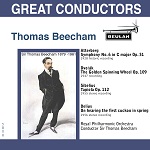 All
these are, as Beulah terms them, Great Conductors, but the greatest
of all for my money was Sir Thomas Beecham. 5BX8K offers
us, predictably, his DELIUS – the 1956 stereo recording of On
hearing the first Cuckoo in Spring – and his Sibelius – Tapiola,
from 1955, also in stereo – but the DVOŘÁK Golden Spinning
Wheel (1947) is less predictable fare and the historic (1927) ATTERBERG Symphony No.6 in C, Op.31, even less so. When this was released
on four 12-inch 78s it cost 26 shillings – around £50 in today’s values.
A treasurable release, even though the Atterberg is also contained on 1PD94 (above). The Dvorák is also contained on Beulah Extra 9BX43 – January 2012/2 – and the Delius on 1BX43 – May
2011/1.
All
these are, as Beulah terms them, Great Conductors, but the greatest
of all for my money was Sir Thomas Beecham. 5BX8K offers
us, predictably, his DELIUS – the 1956 stereo recording of On
hearing the first Cuckoo in Spring – and his Sibelius – Tapiola,
from 1955, also in stereo – but the DVOŘÁK Golden Spinning
Wheel (1947) is less predictable fare and the historic (1927) ATTERBERG Symphony No.6 in C, Op.31, even less so. When this was released
on four 12-inch 78s it cost 26 shillings – around £50 in today’s values.
A treasurable release, even though the Atterberg is also contained on 1PD94 (above). The Dvorák is also contained on Beulah Extra 9BX43 – January 2012/2 – and the Delius on 1BX43 – May
2011/1.
I’ll try to deal with the albums conducted by Sir Malcolm Sargent, Eduard
van Beinum, Albert Coates and Charles Munch and those featuring Campoli,
David Oistrakh and Yehudi Menuhin and other albums next month.



 All Nimbus reviews
All Nimbus reviews








